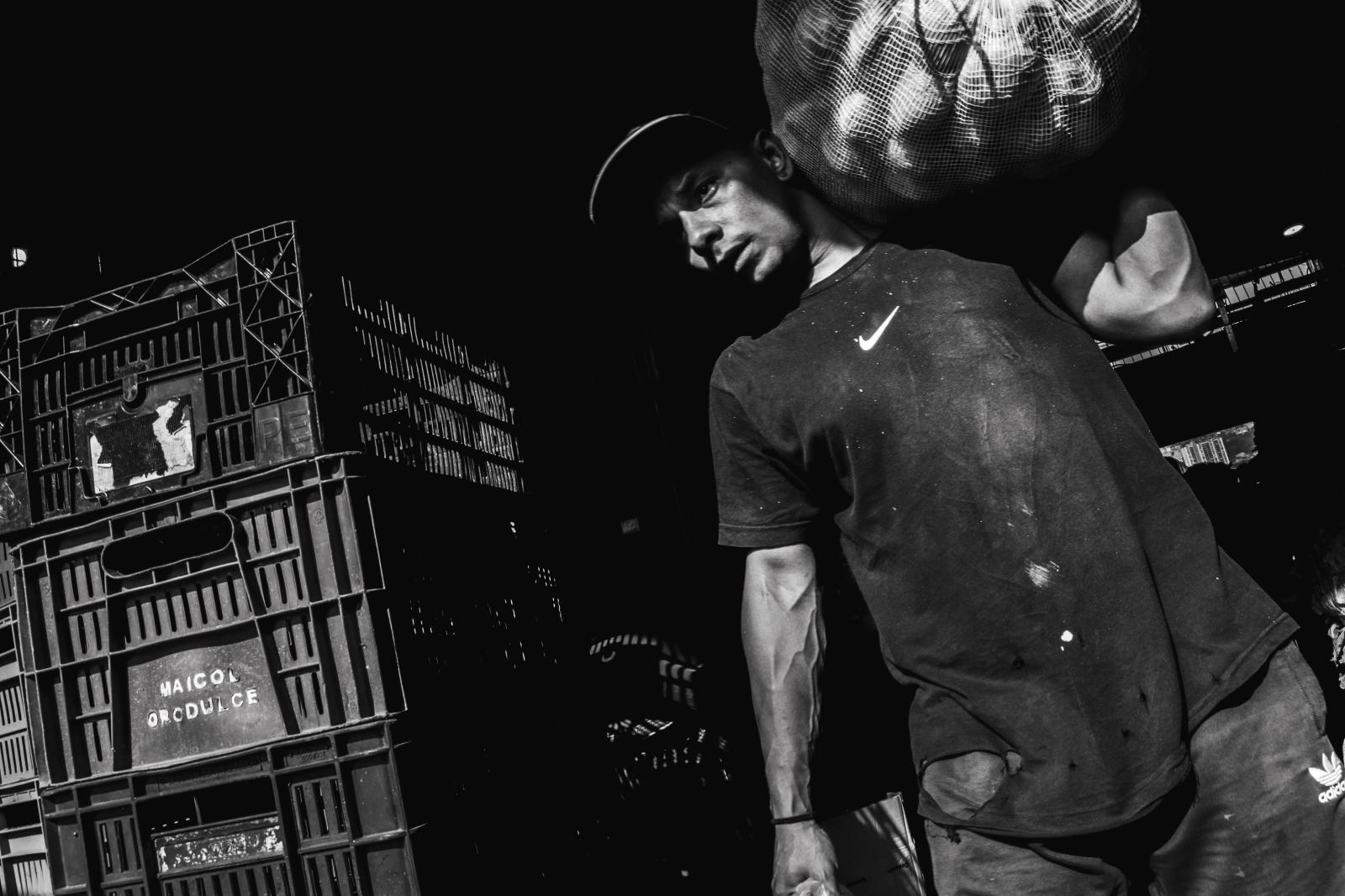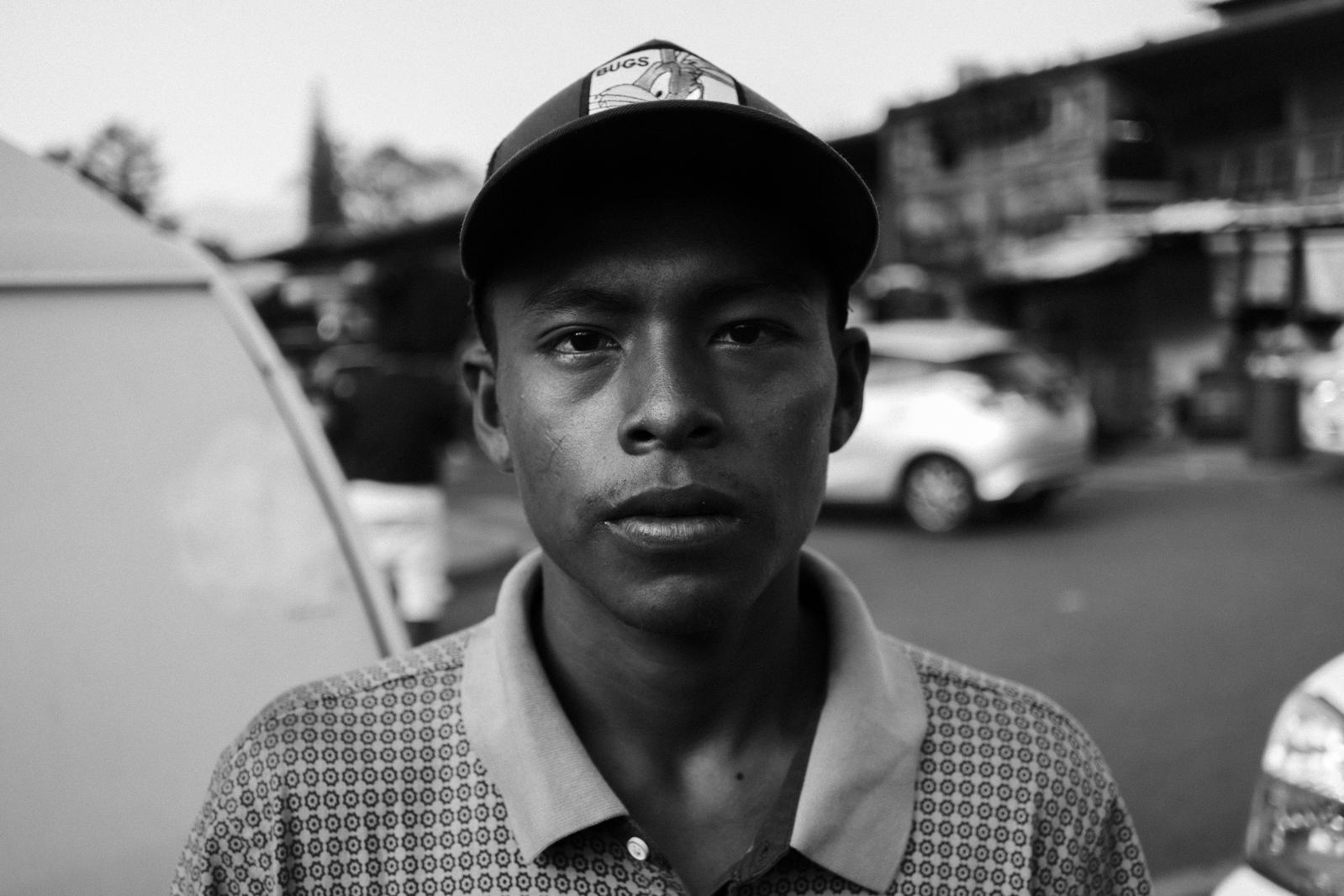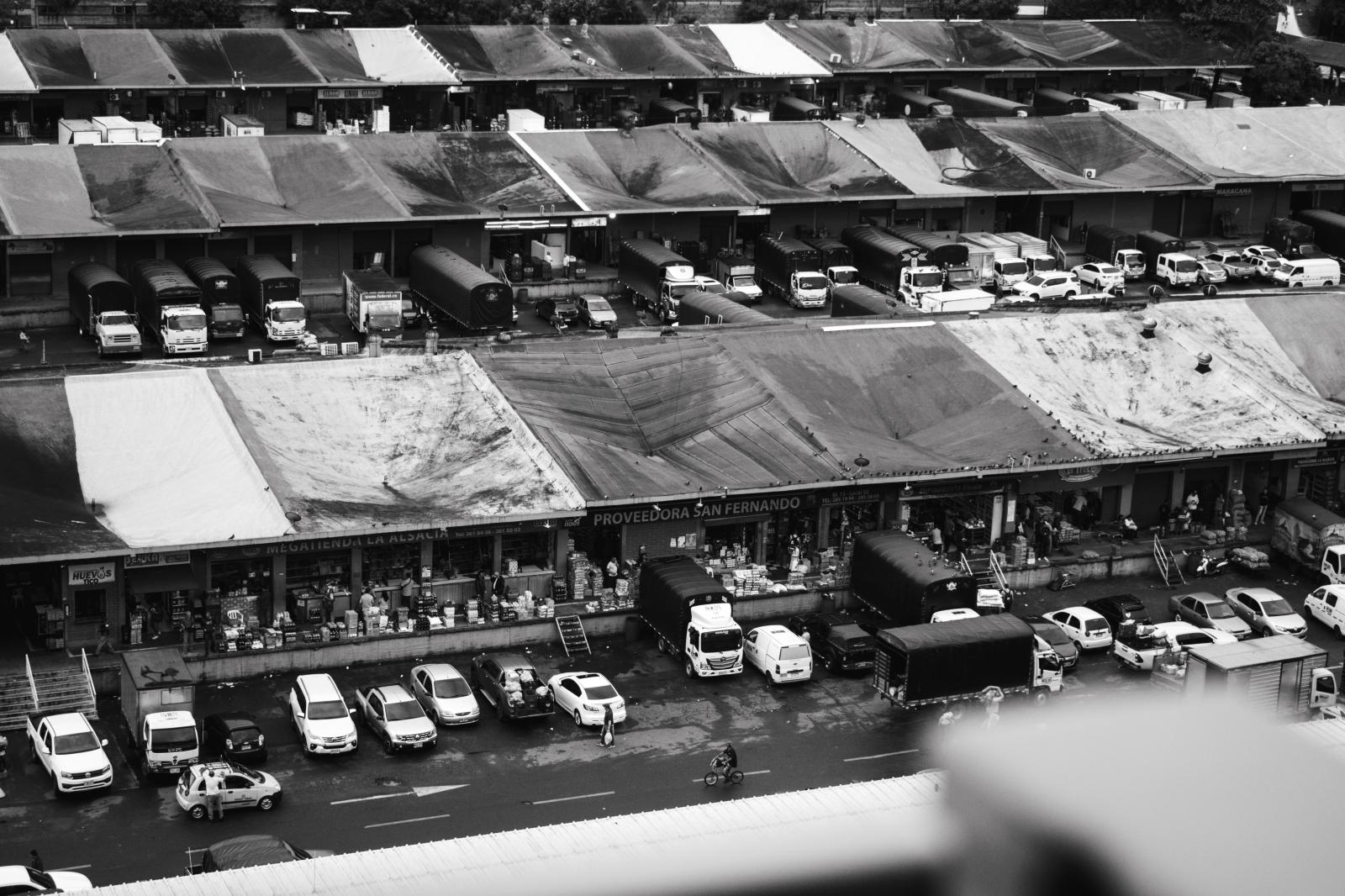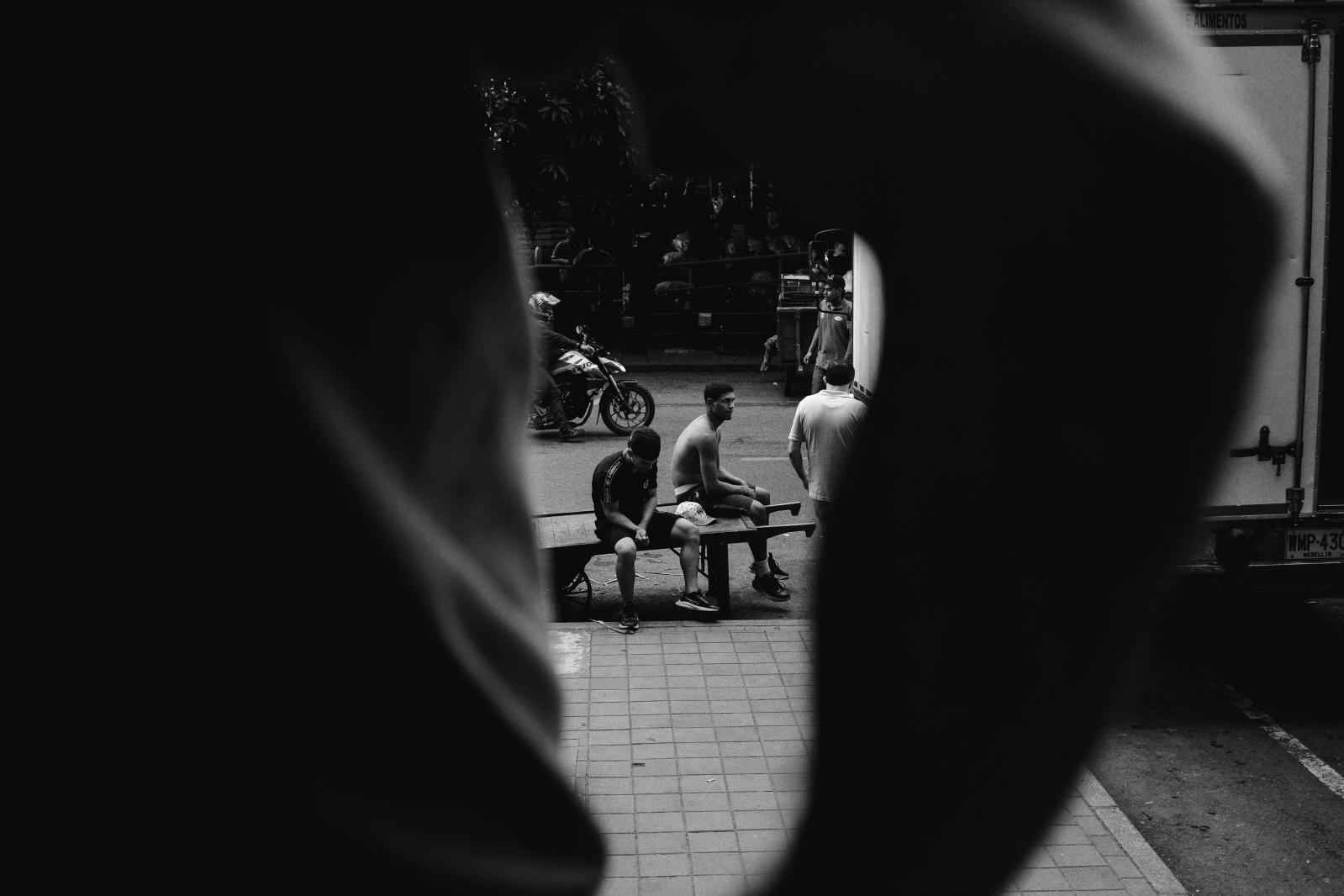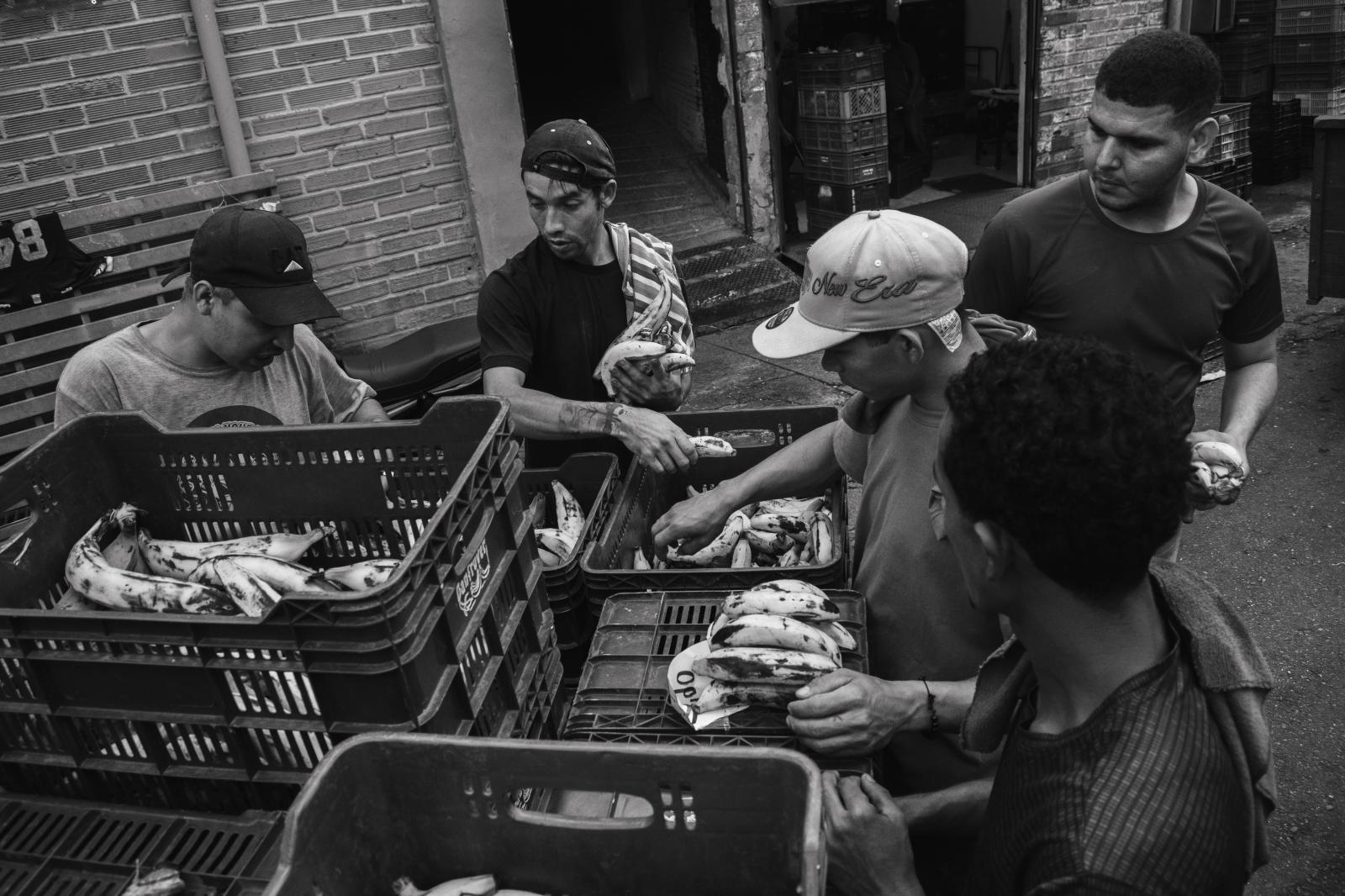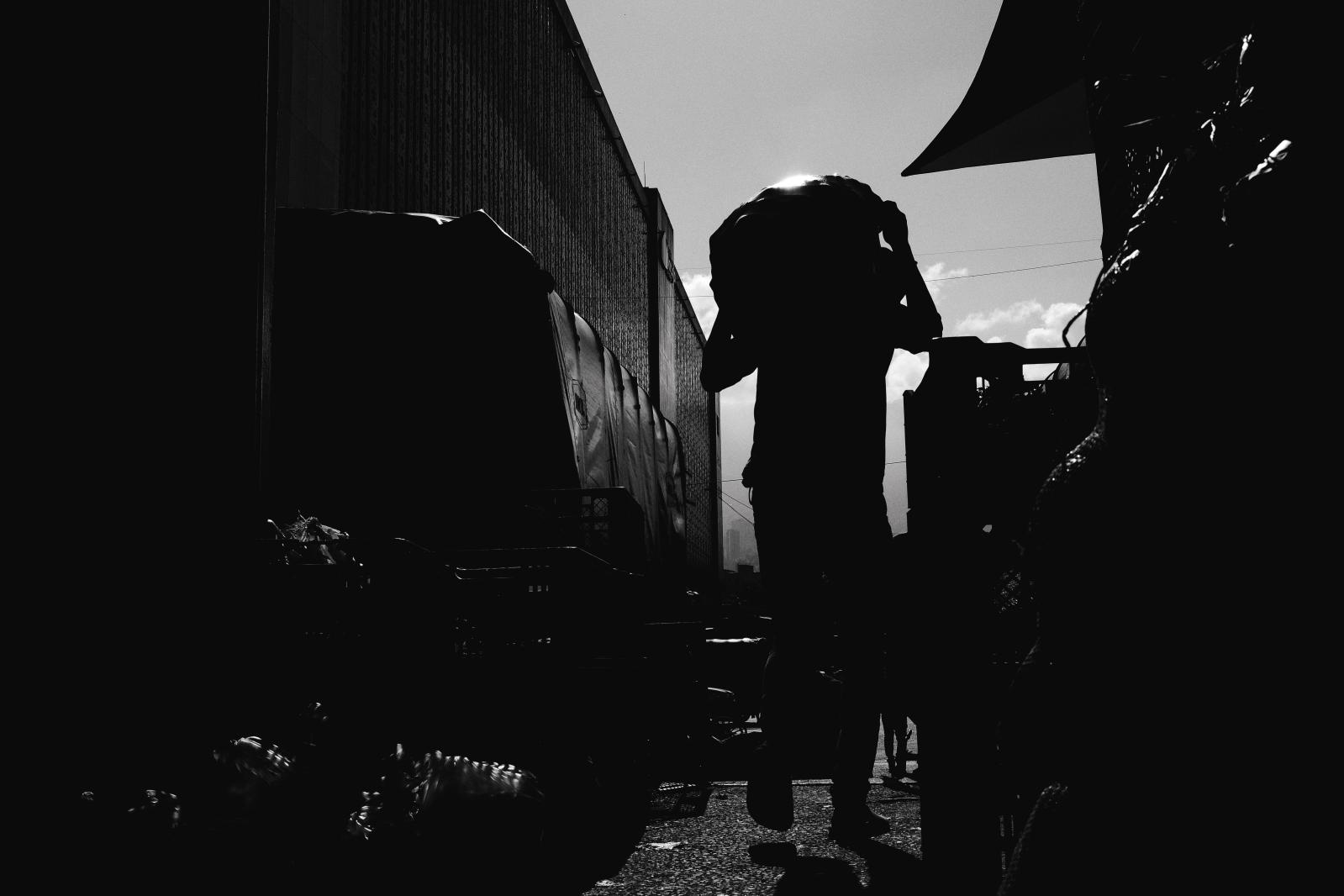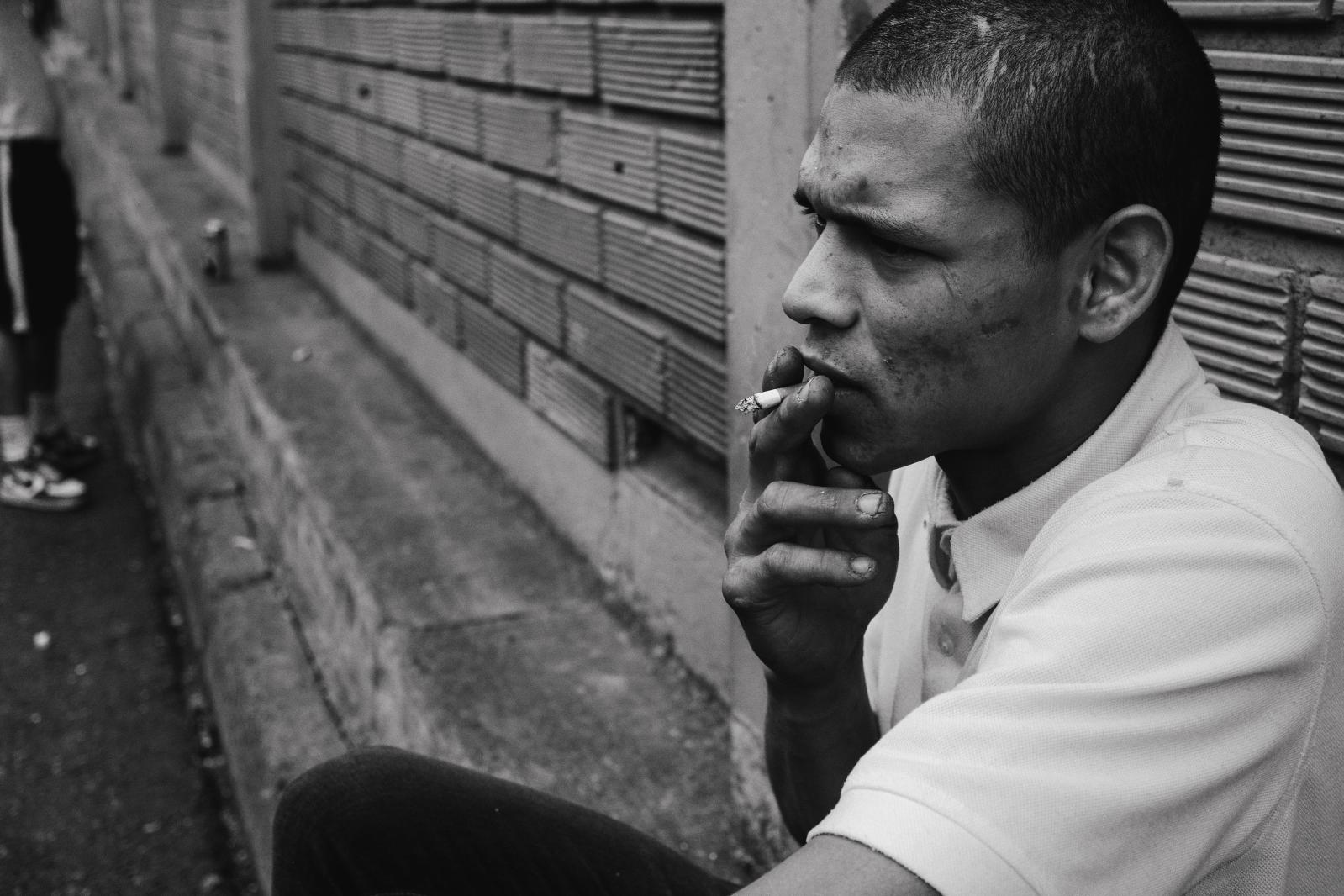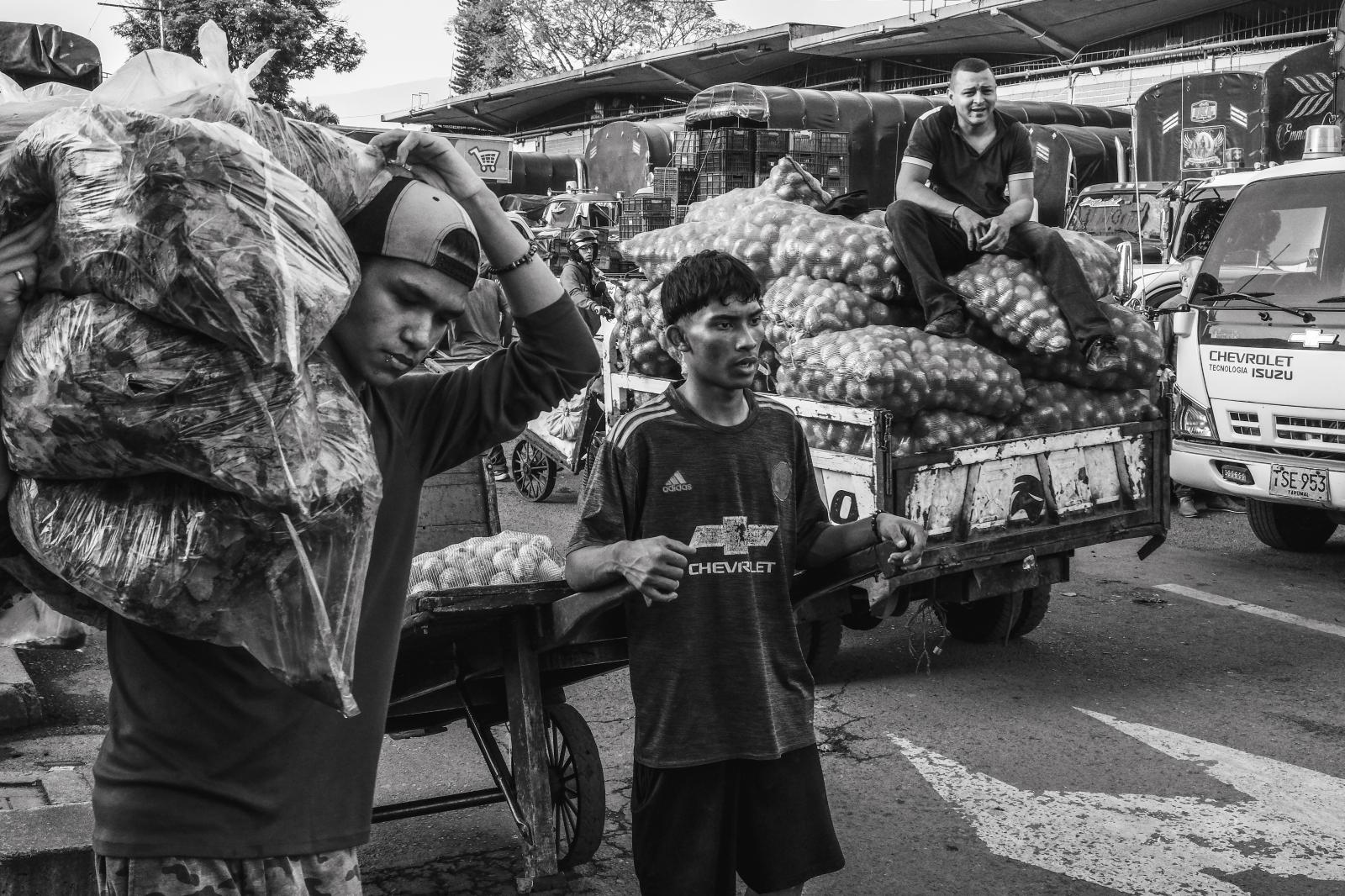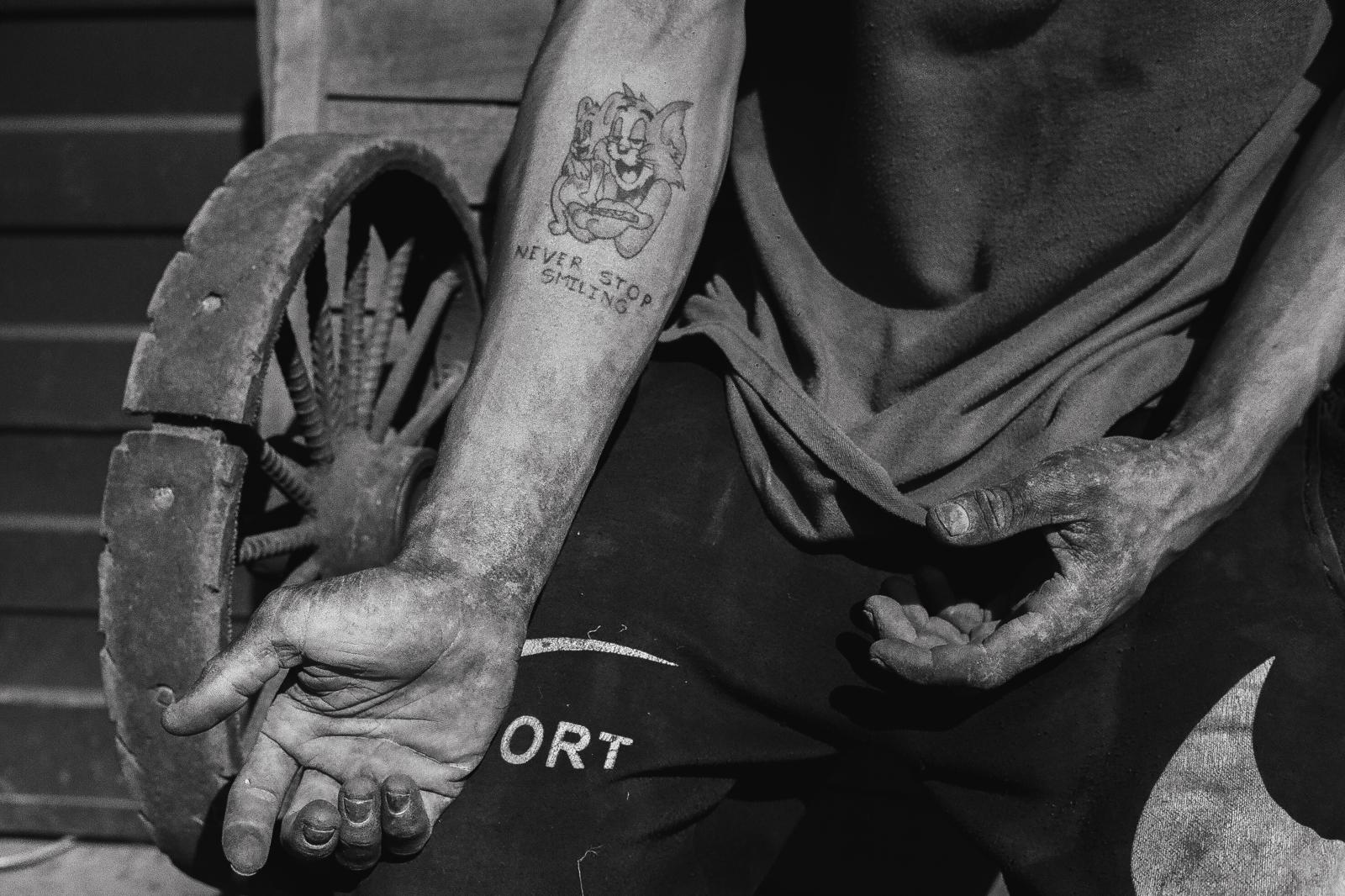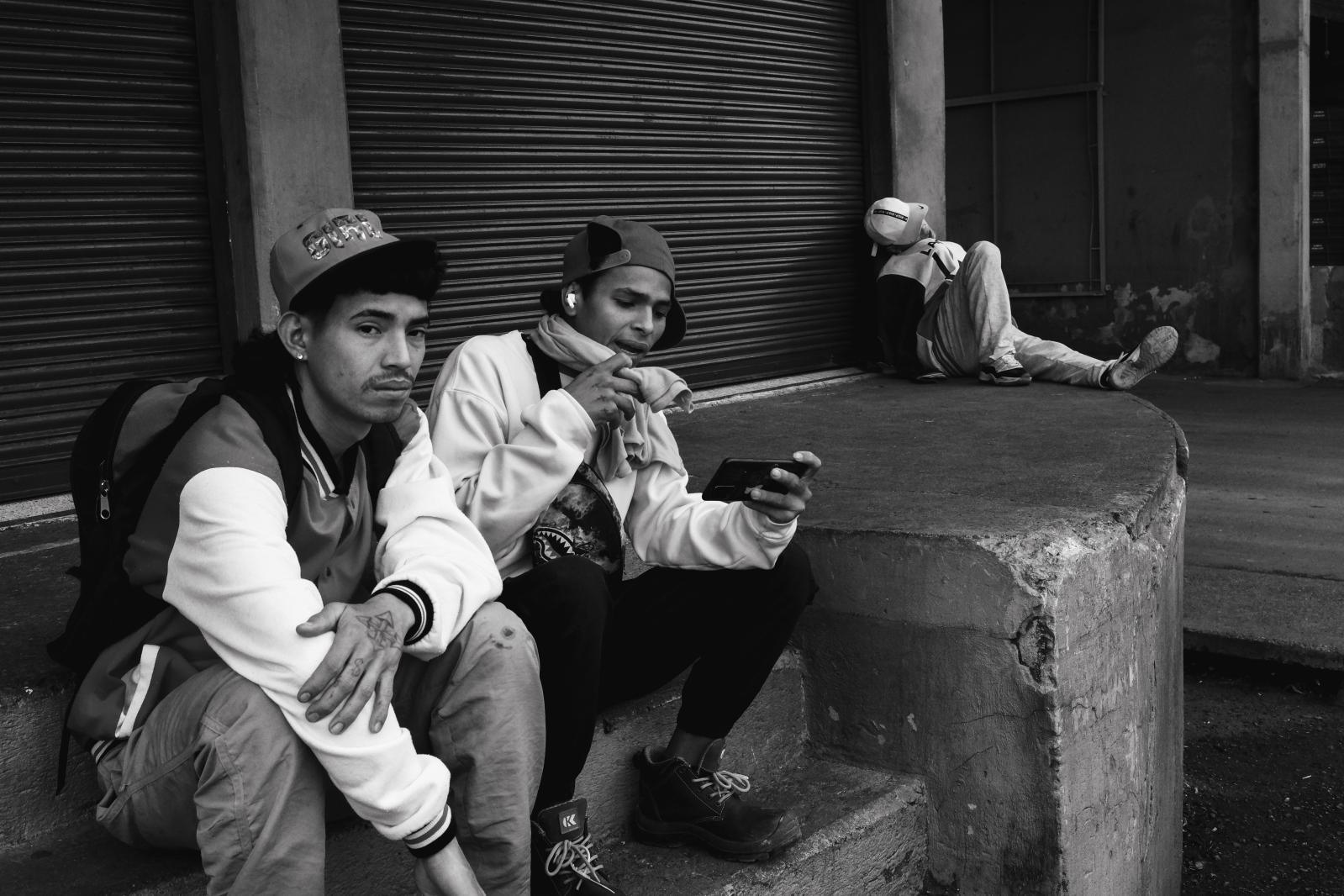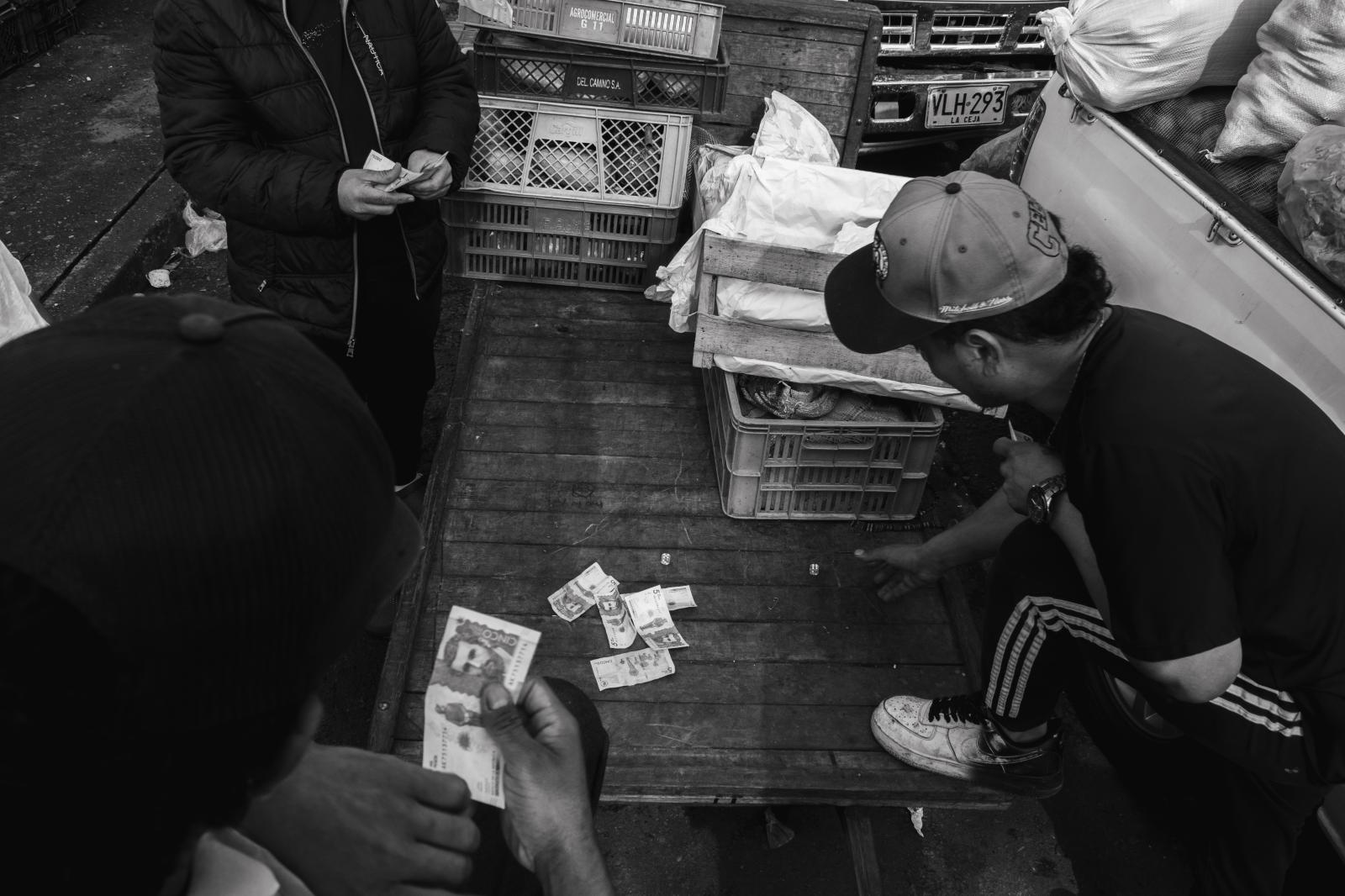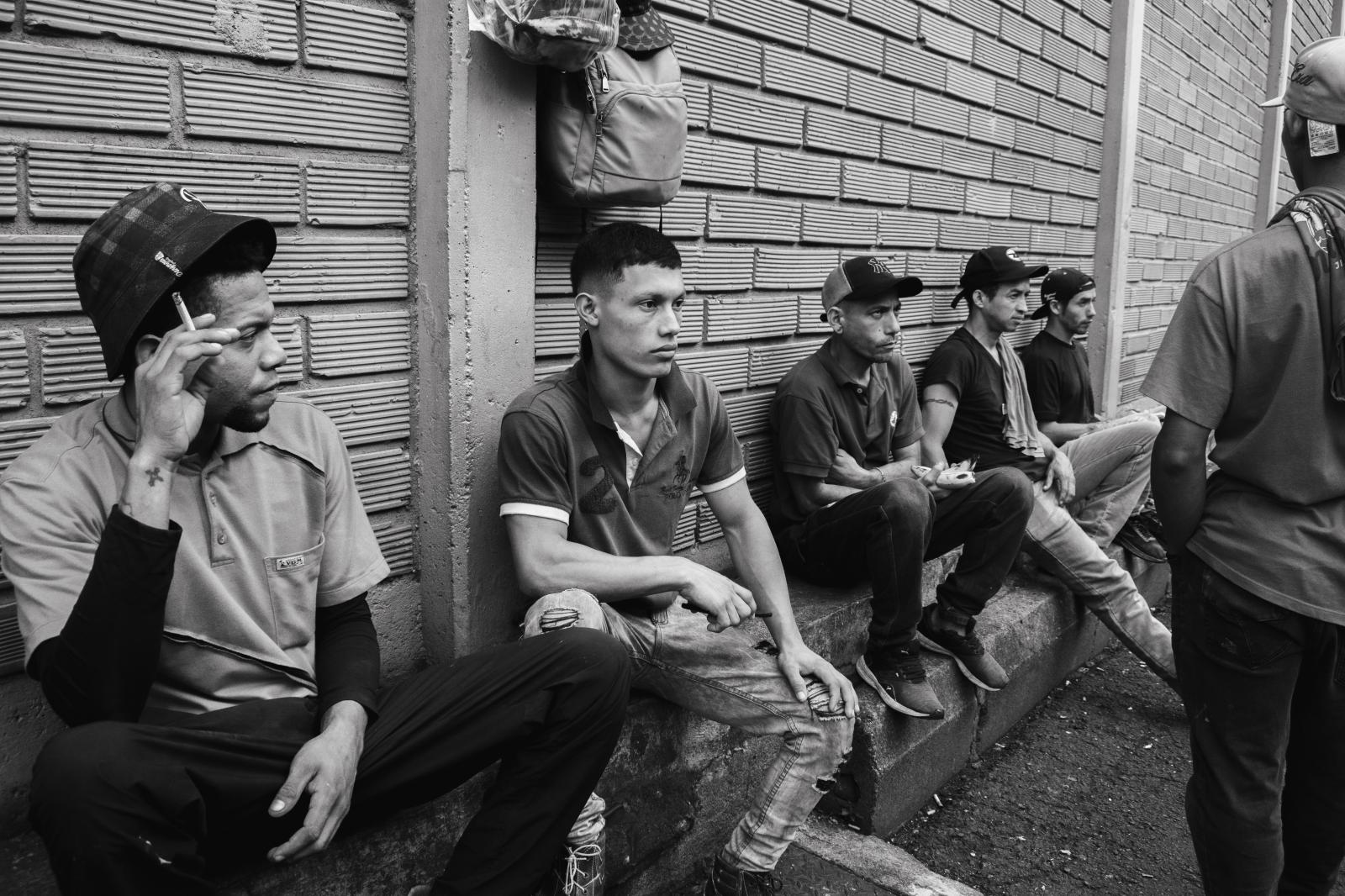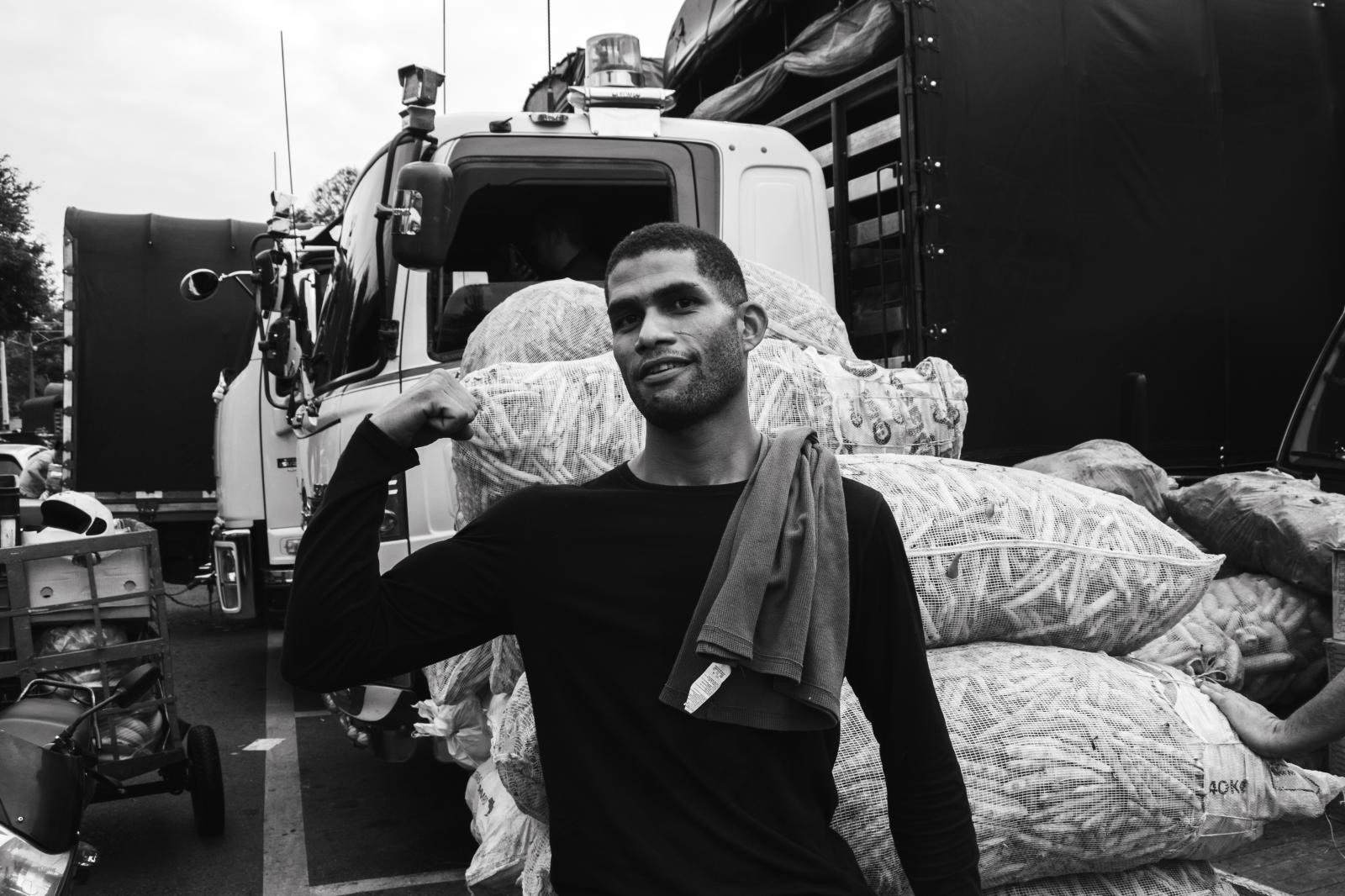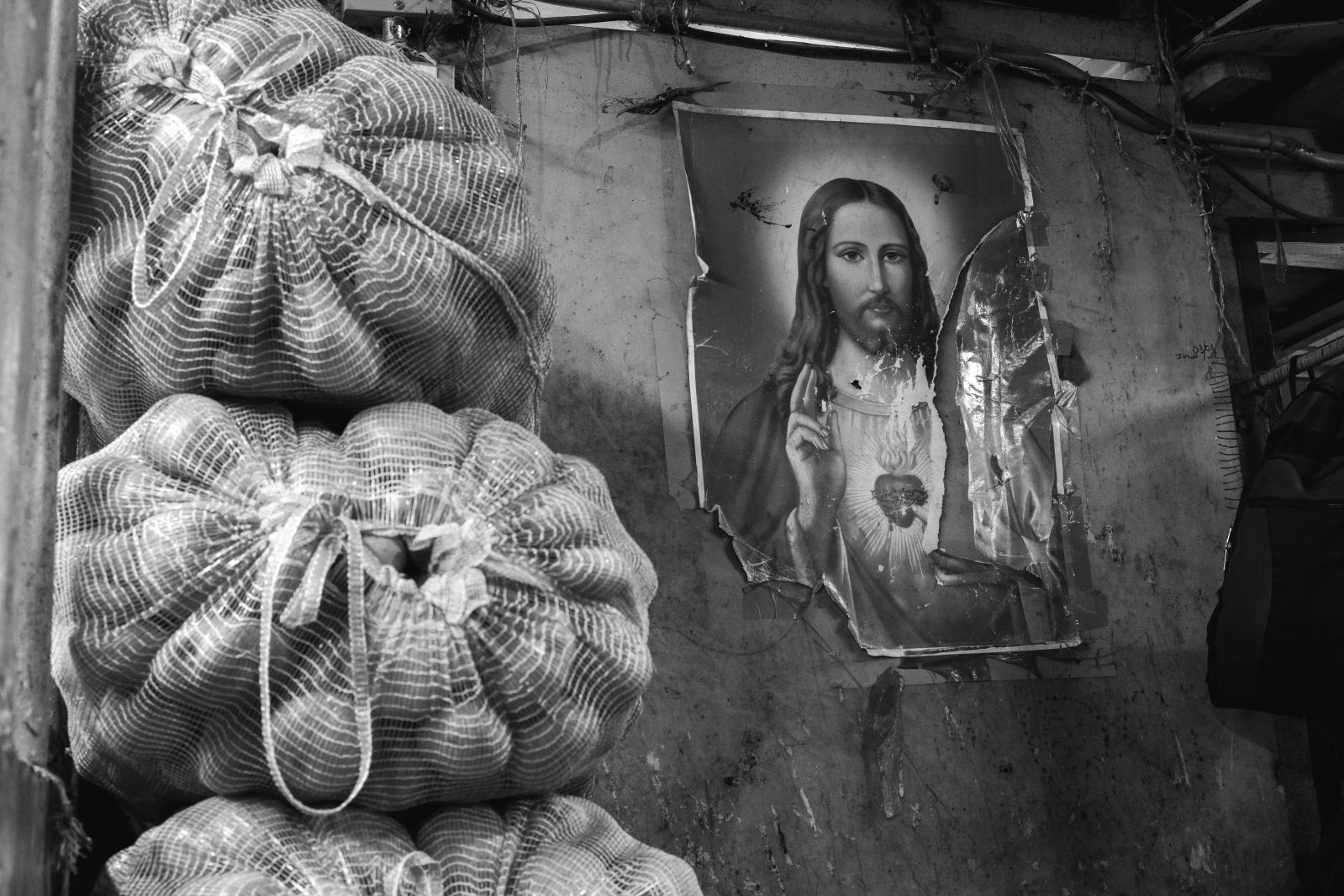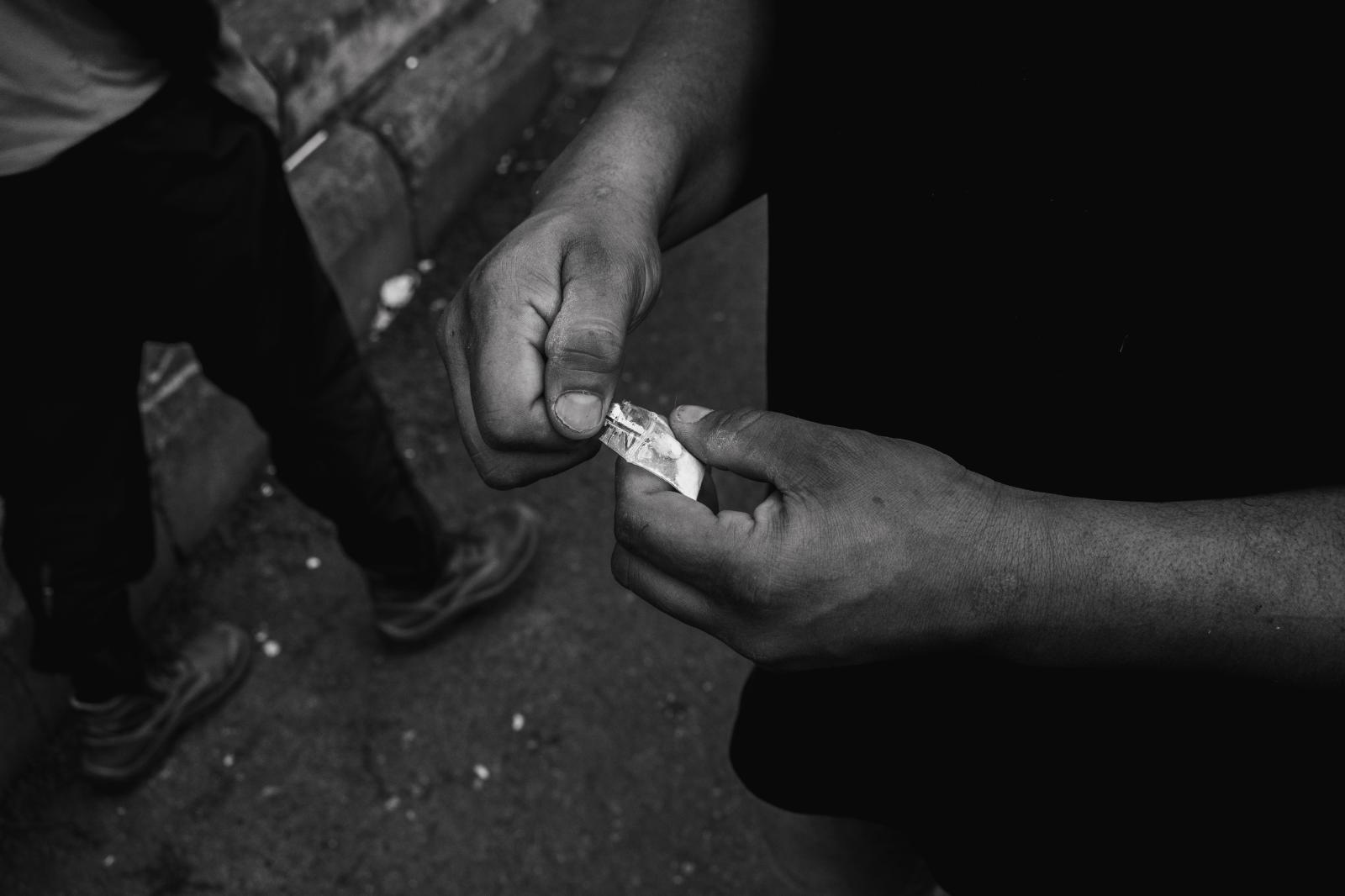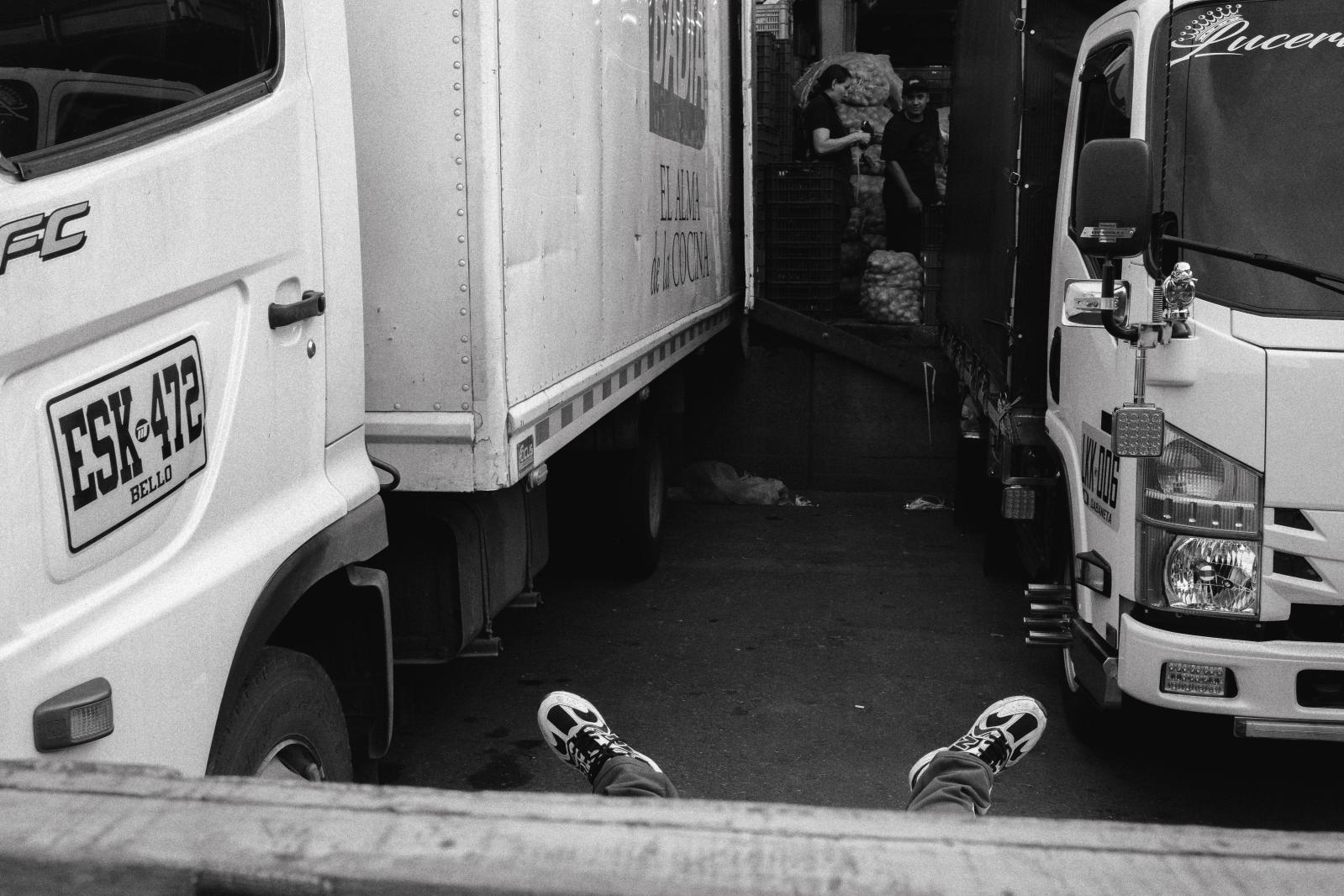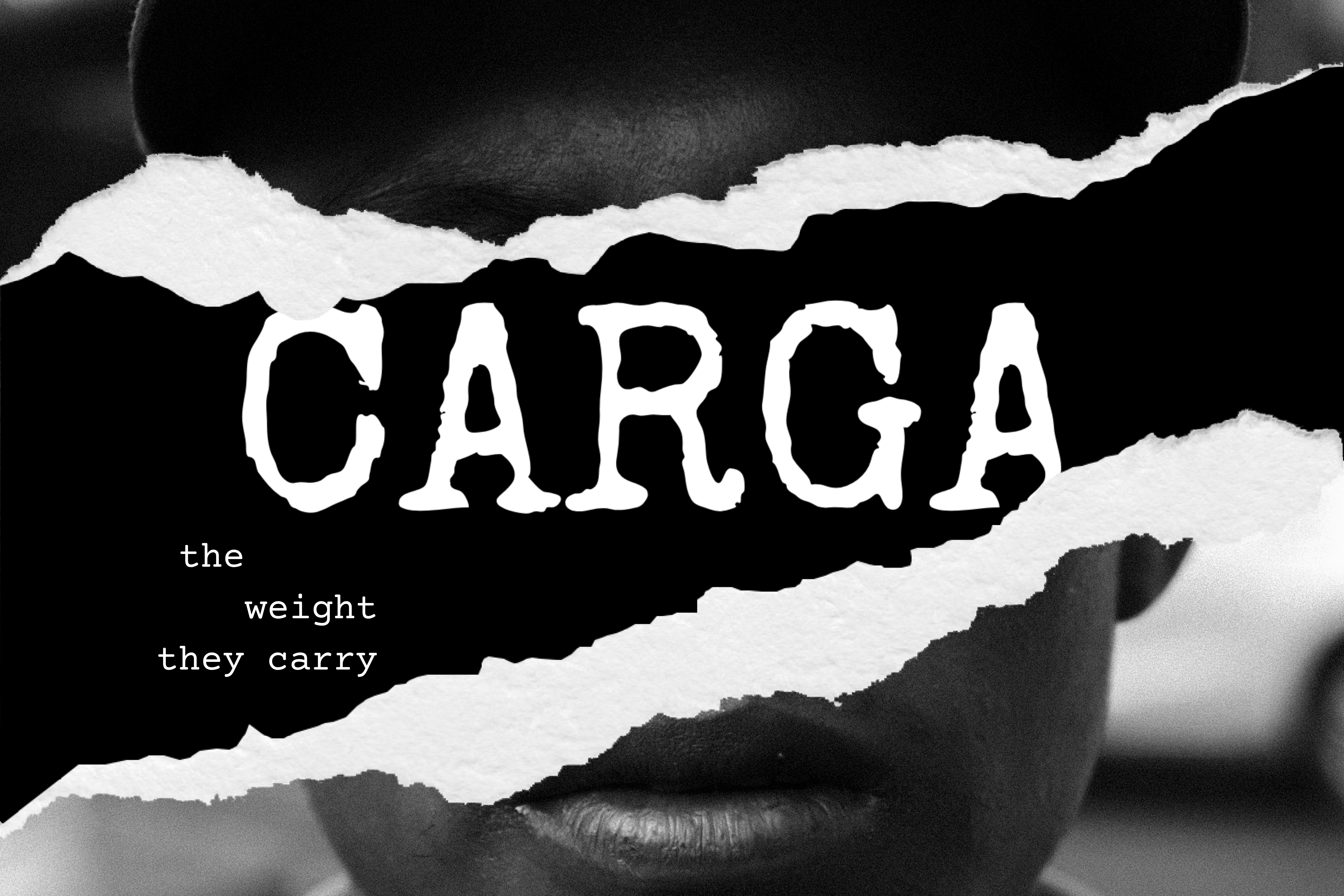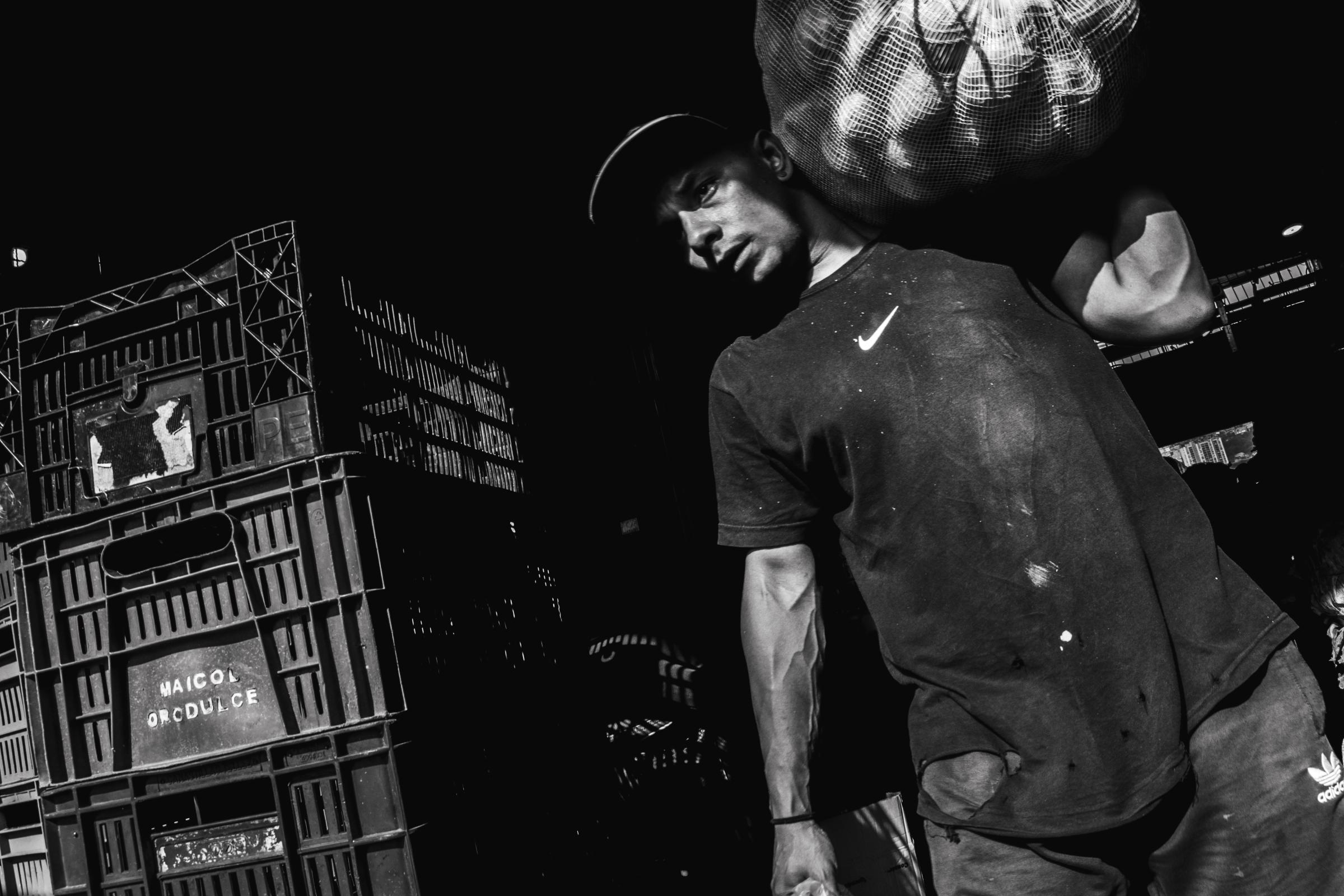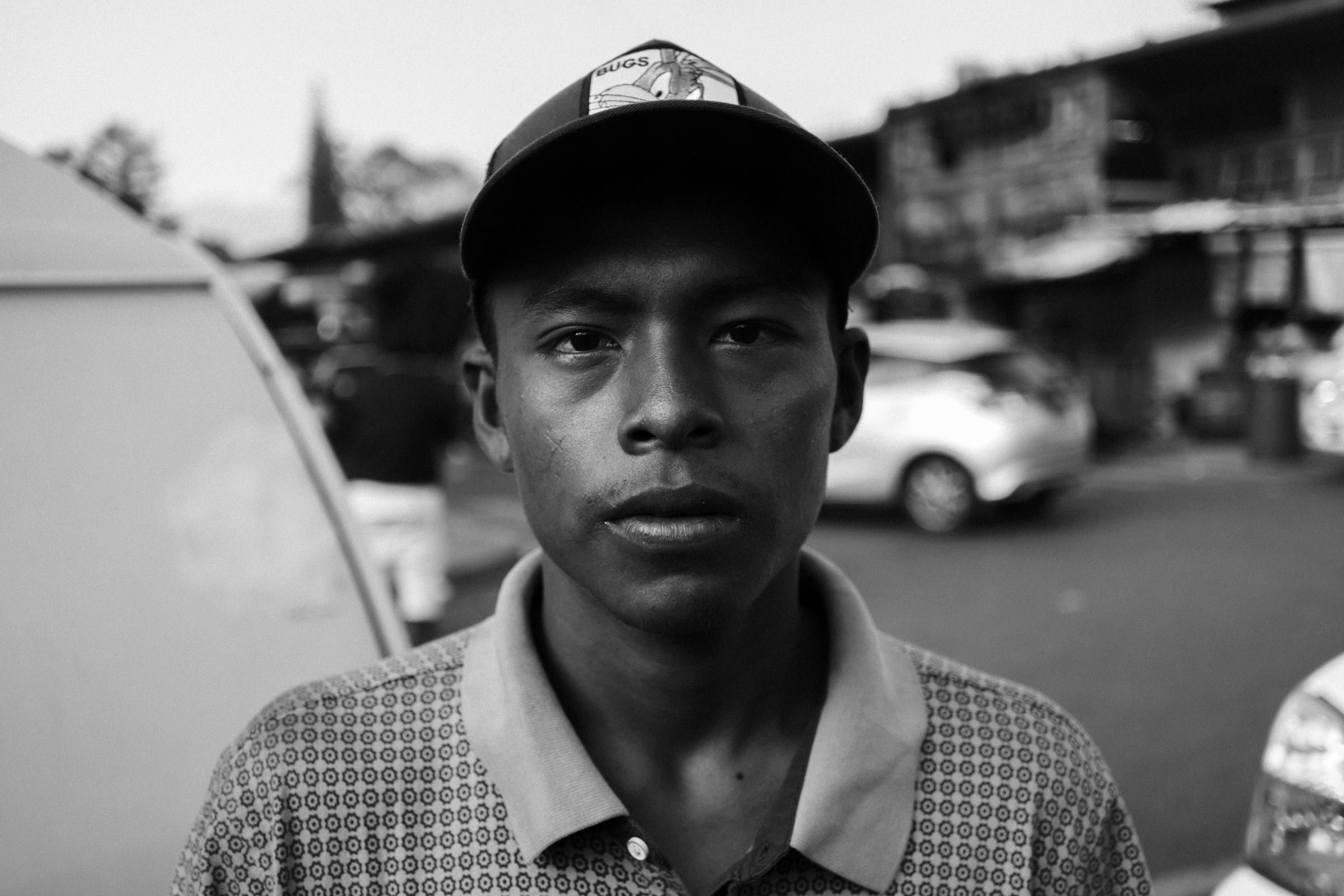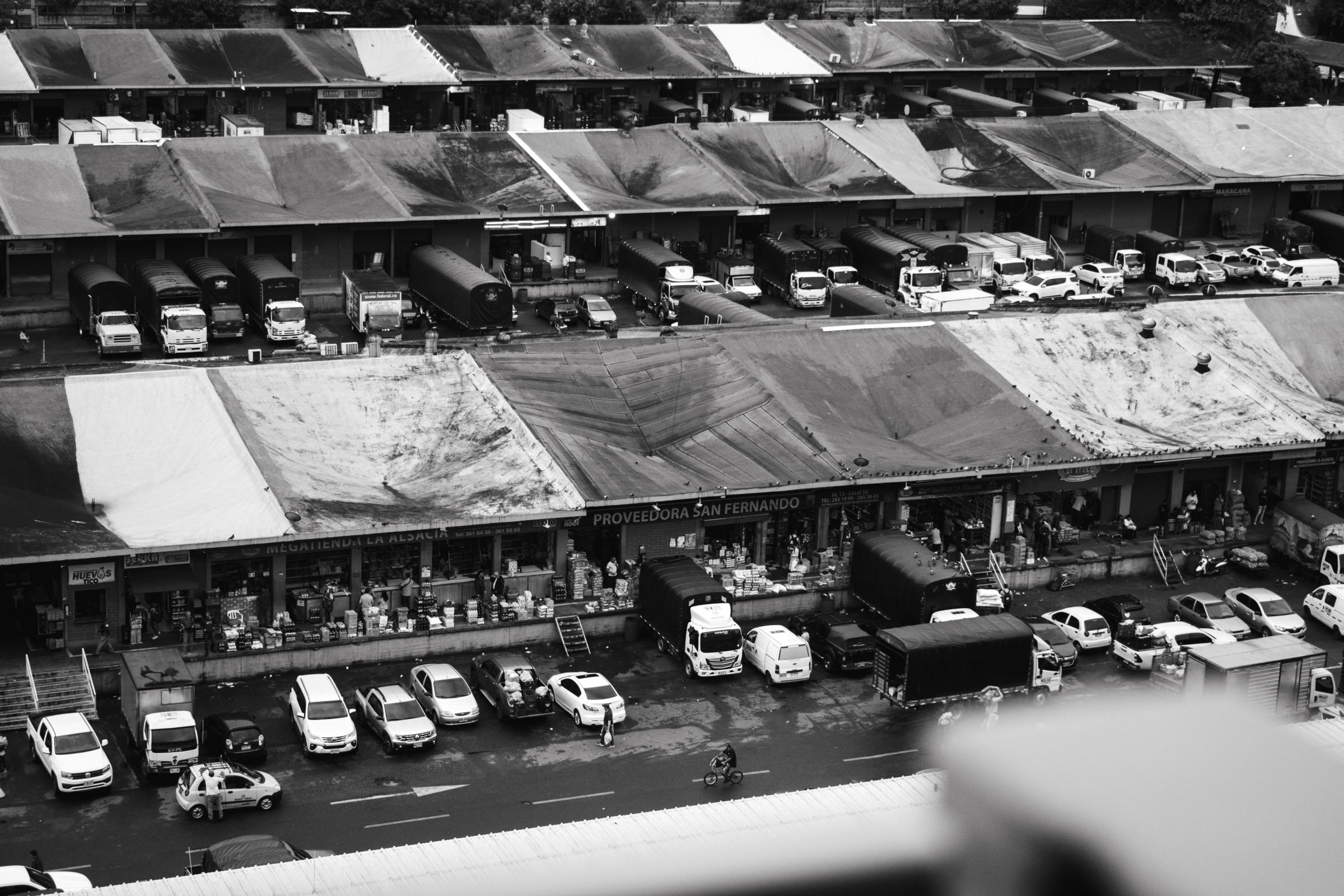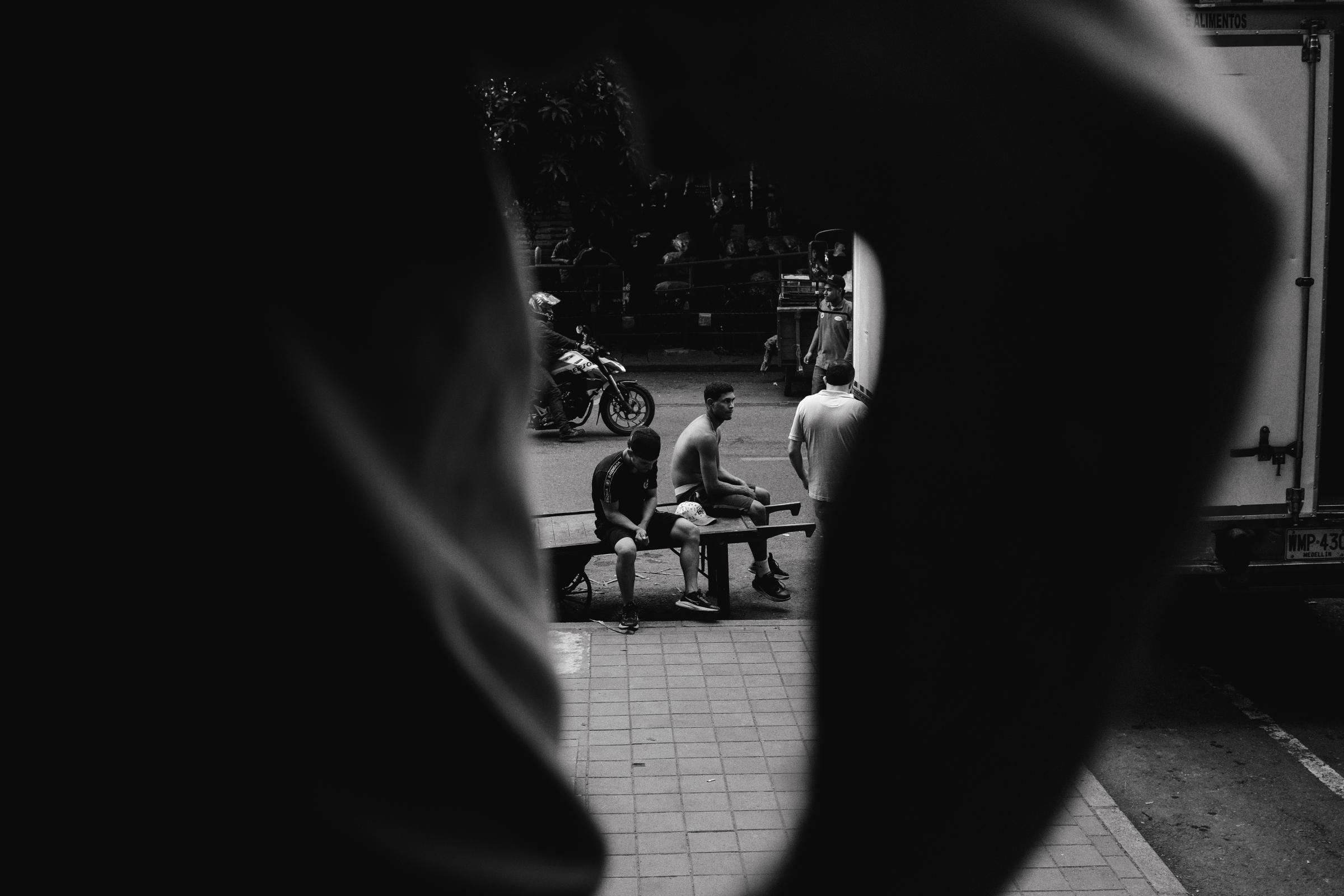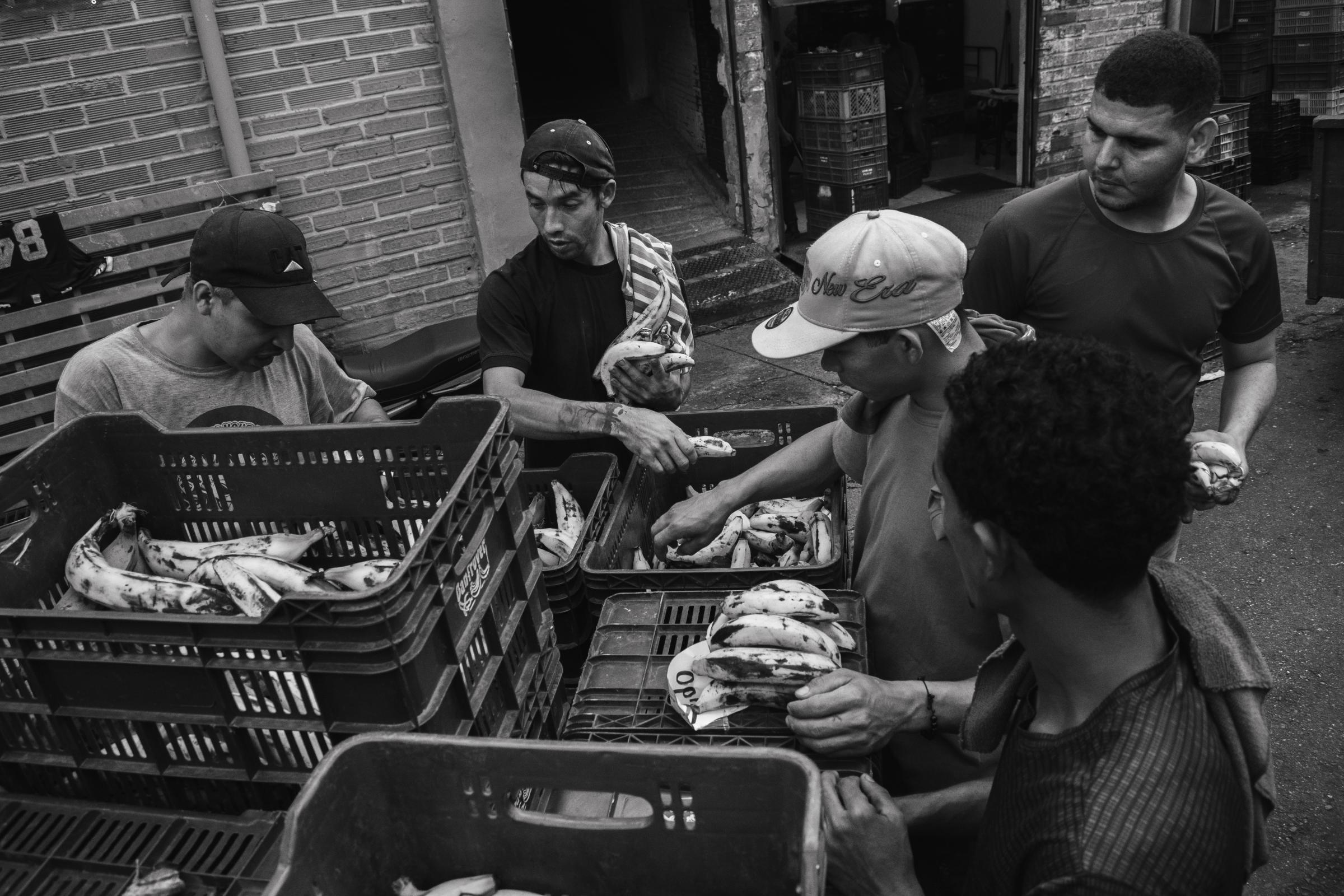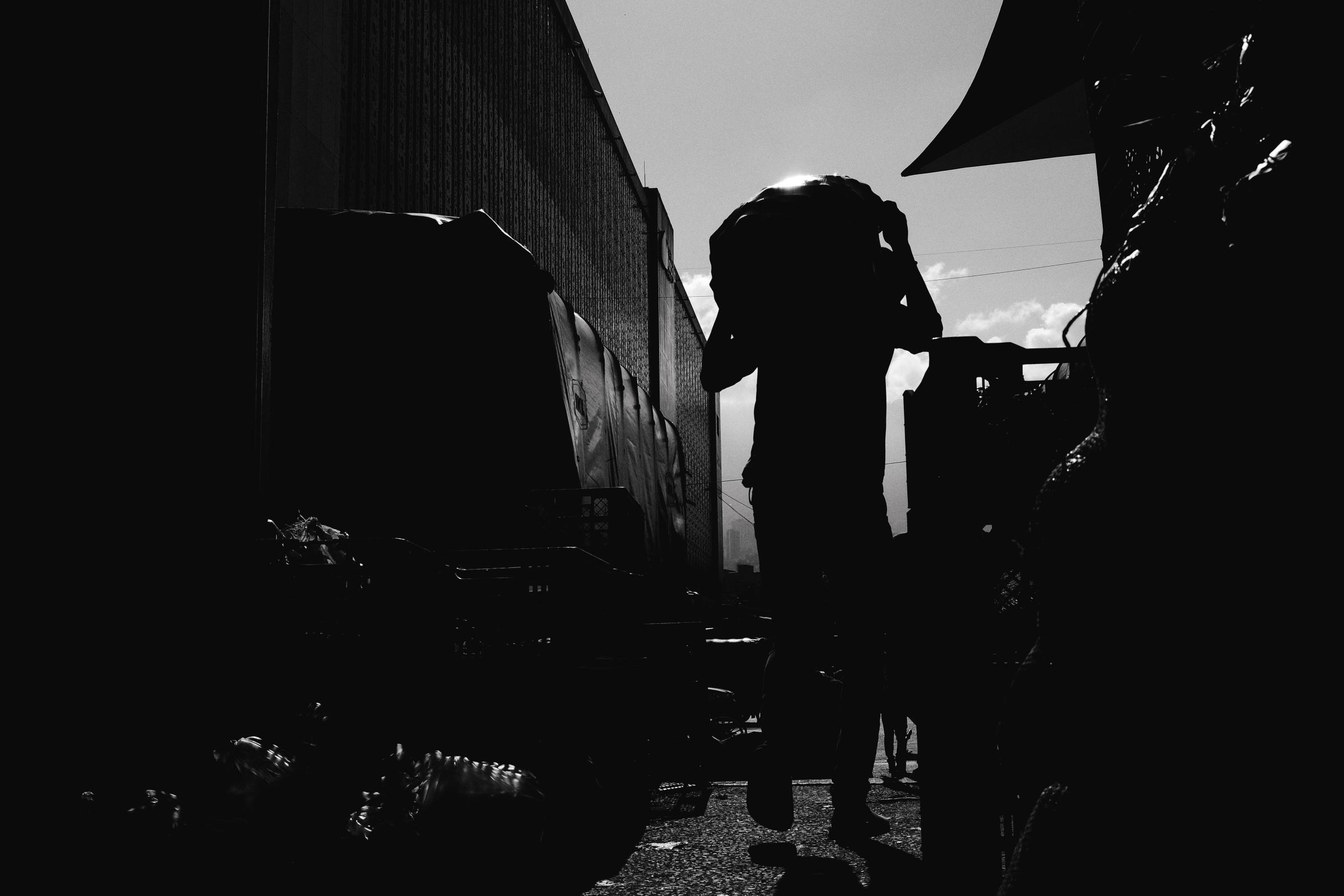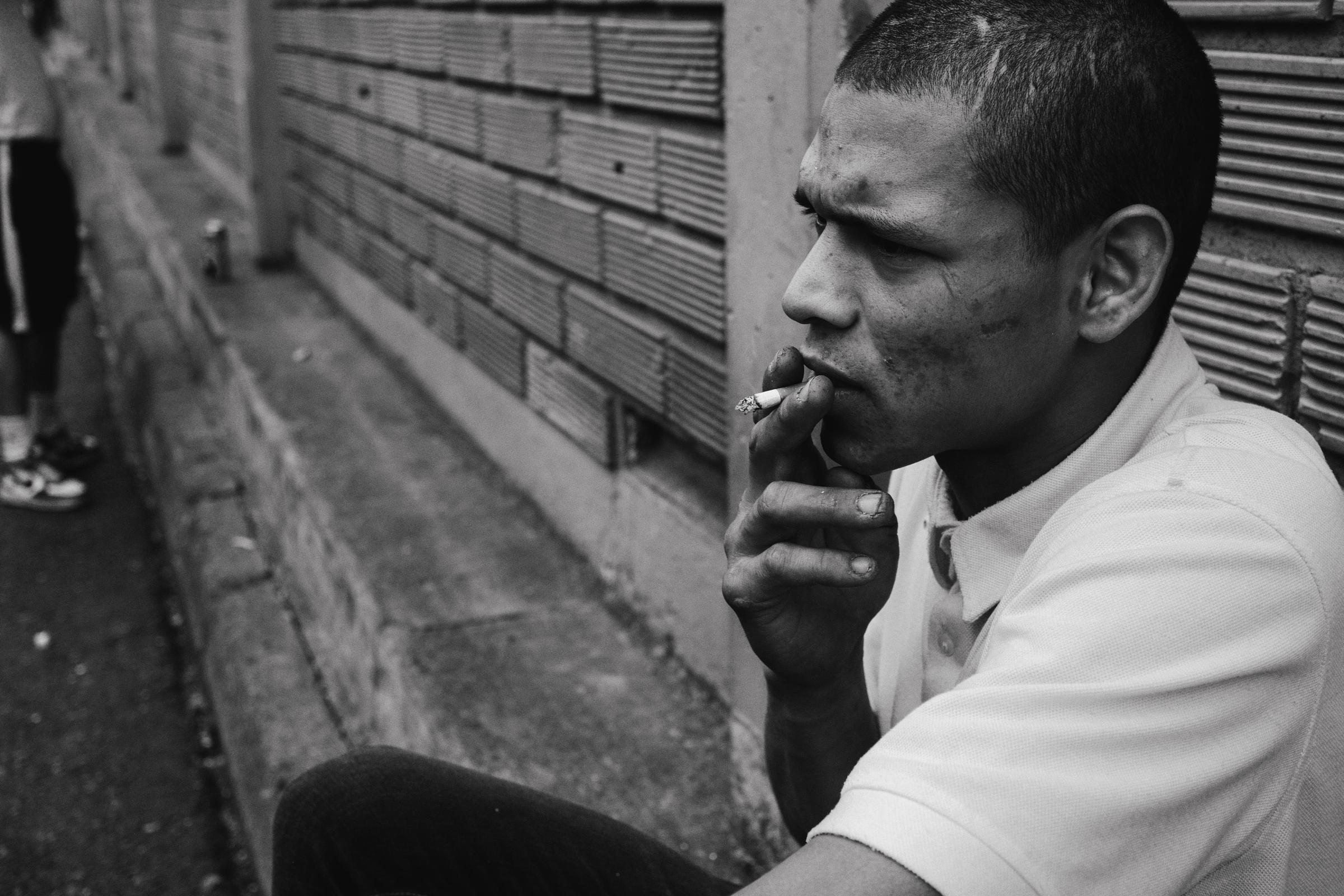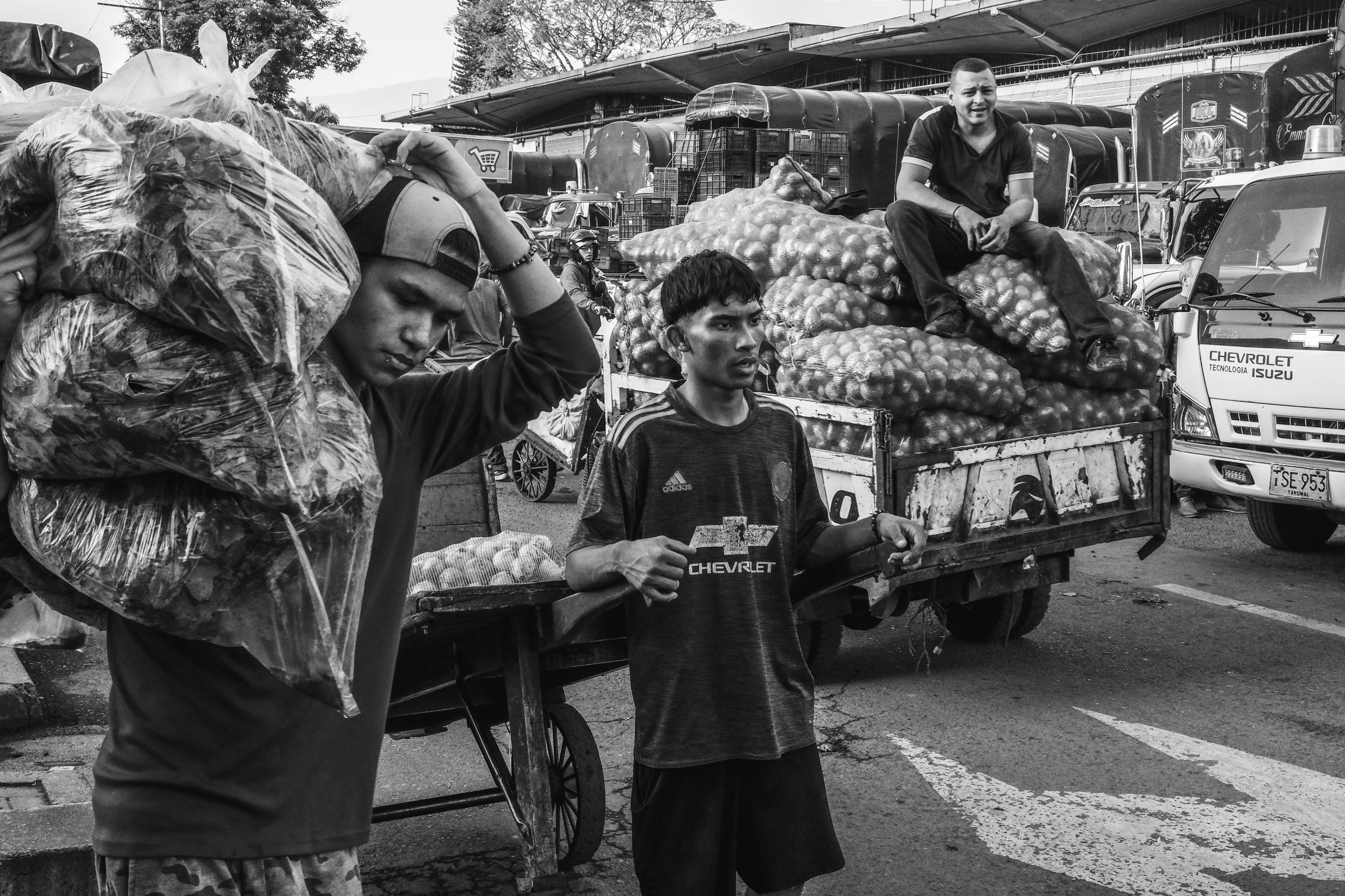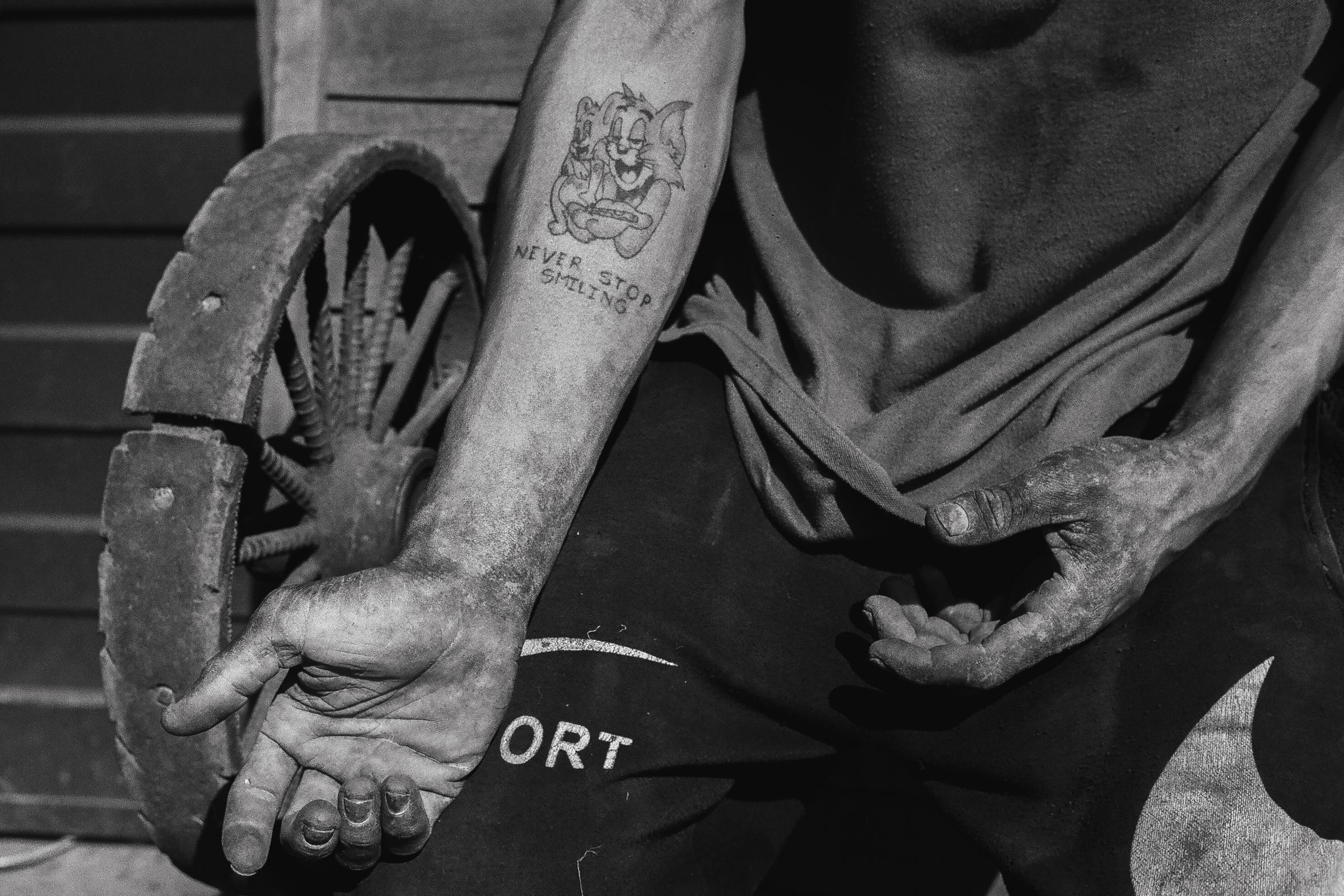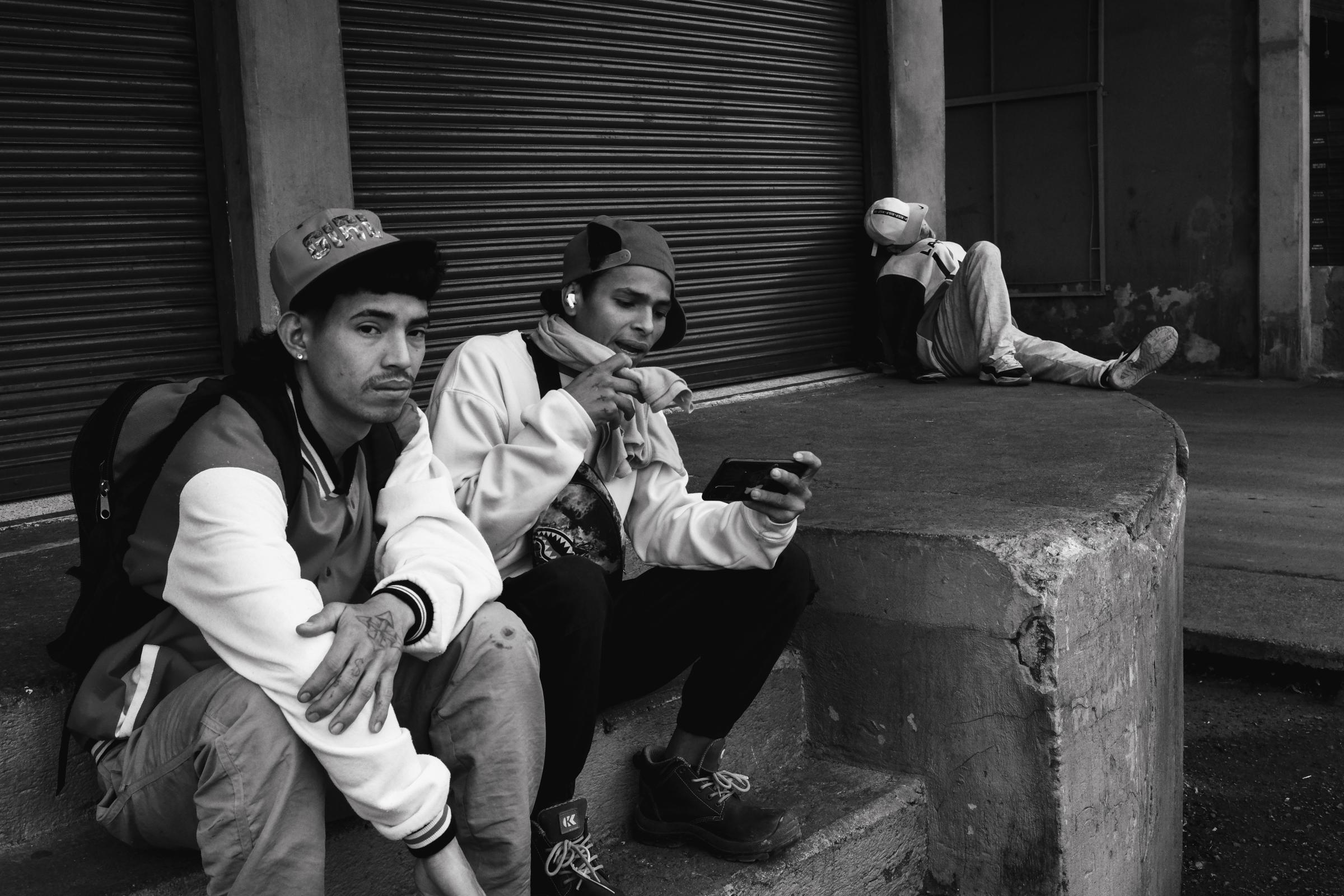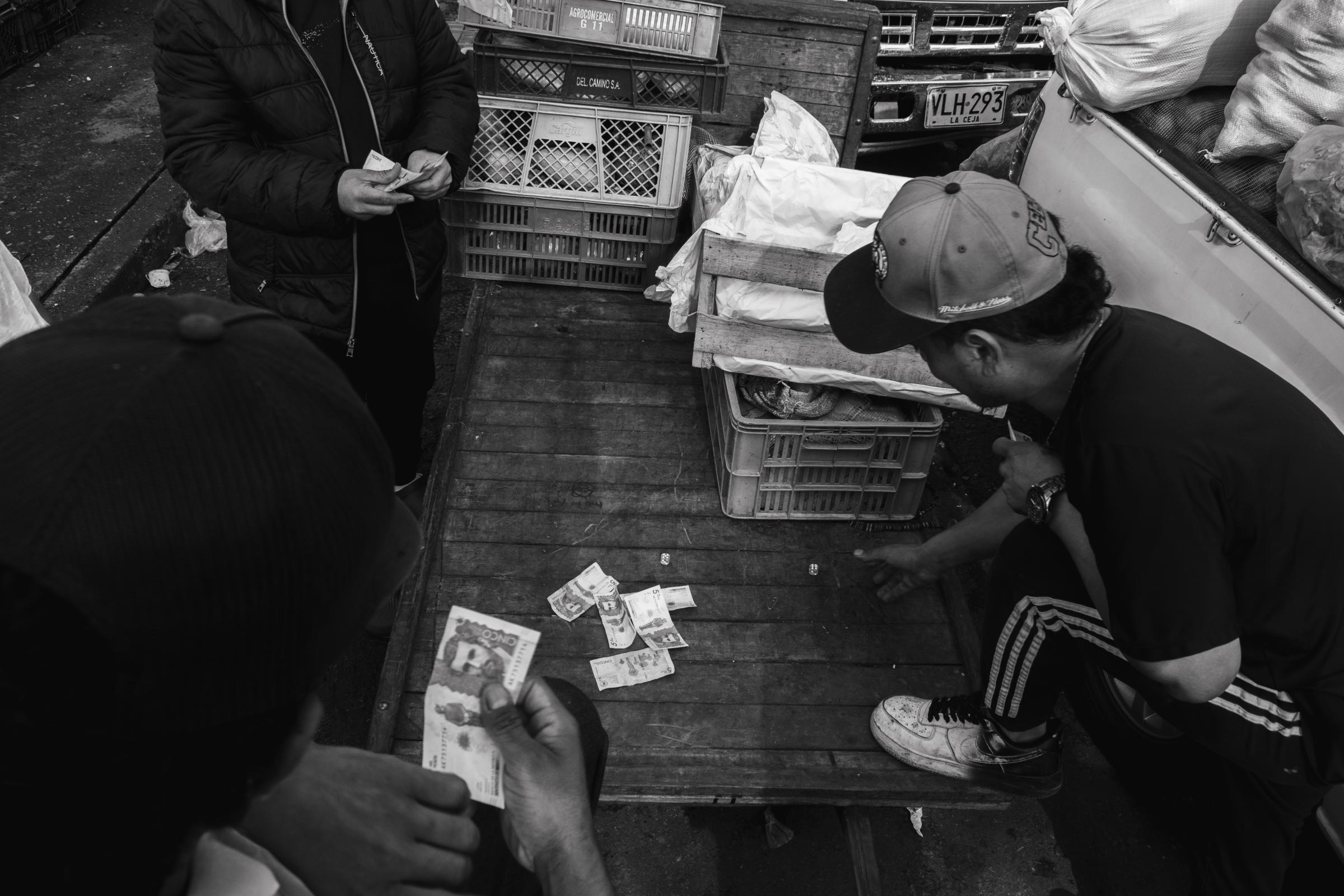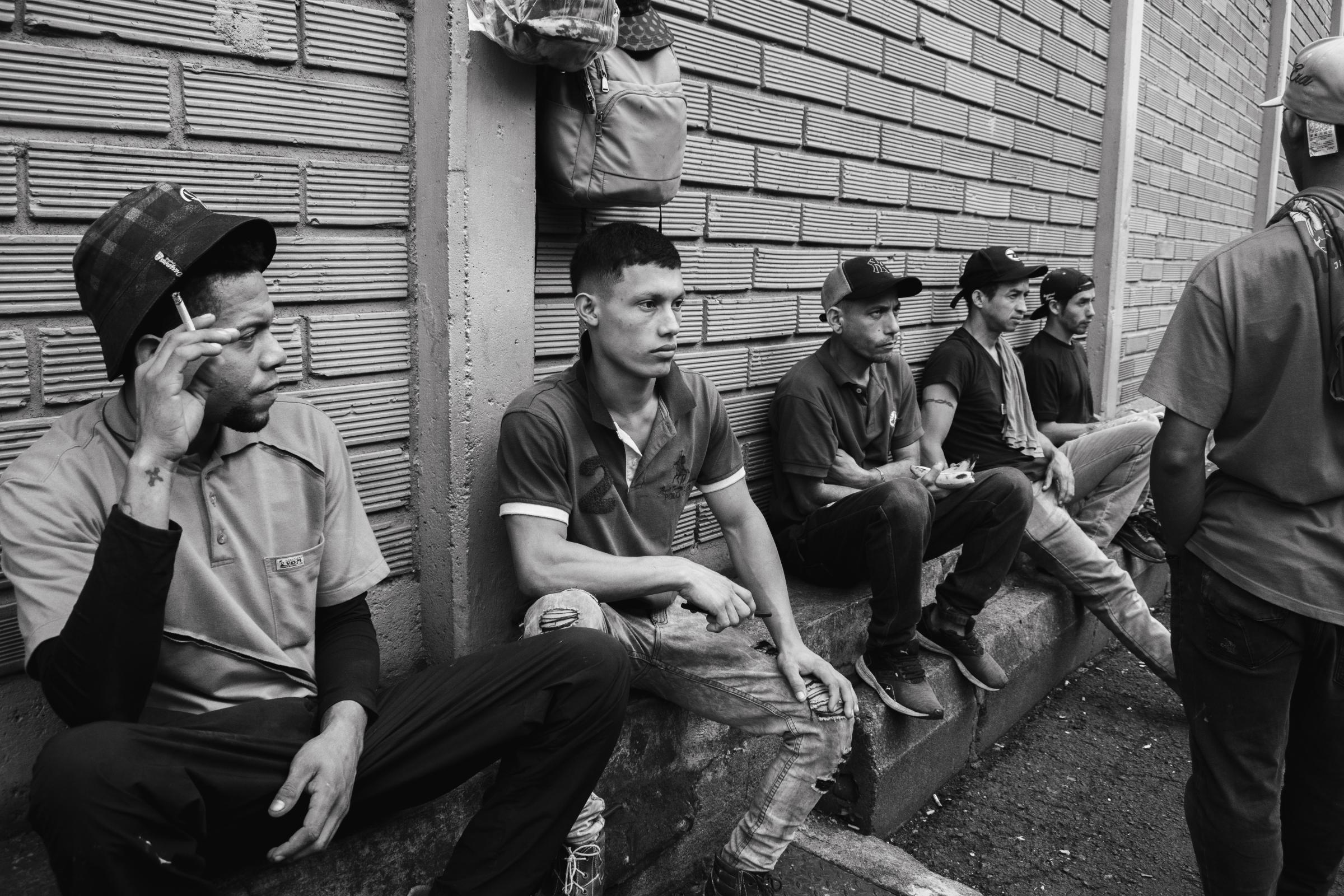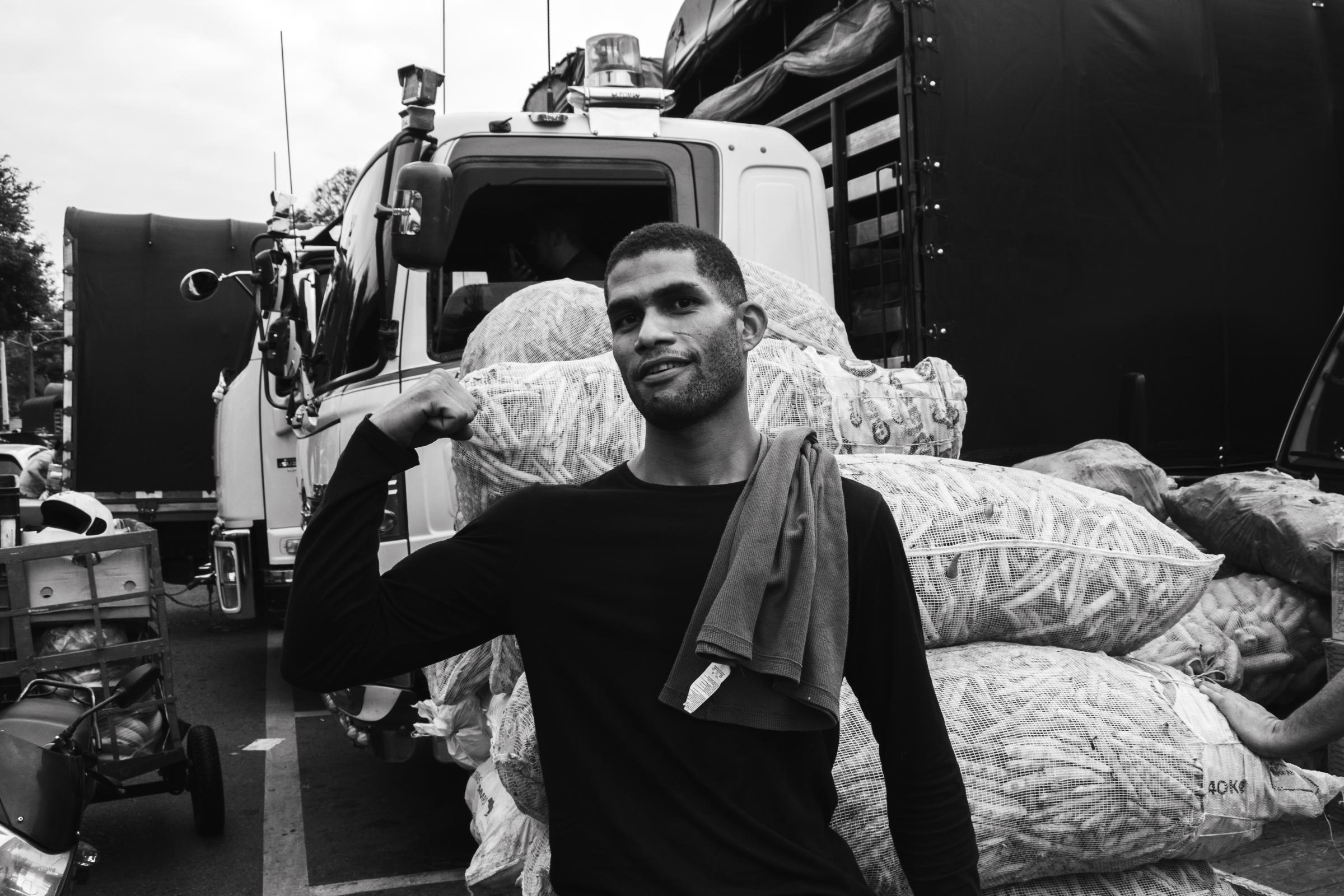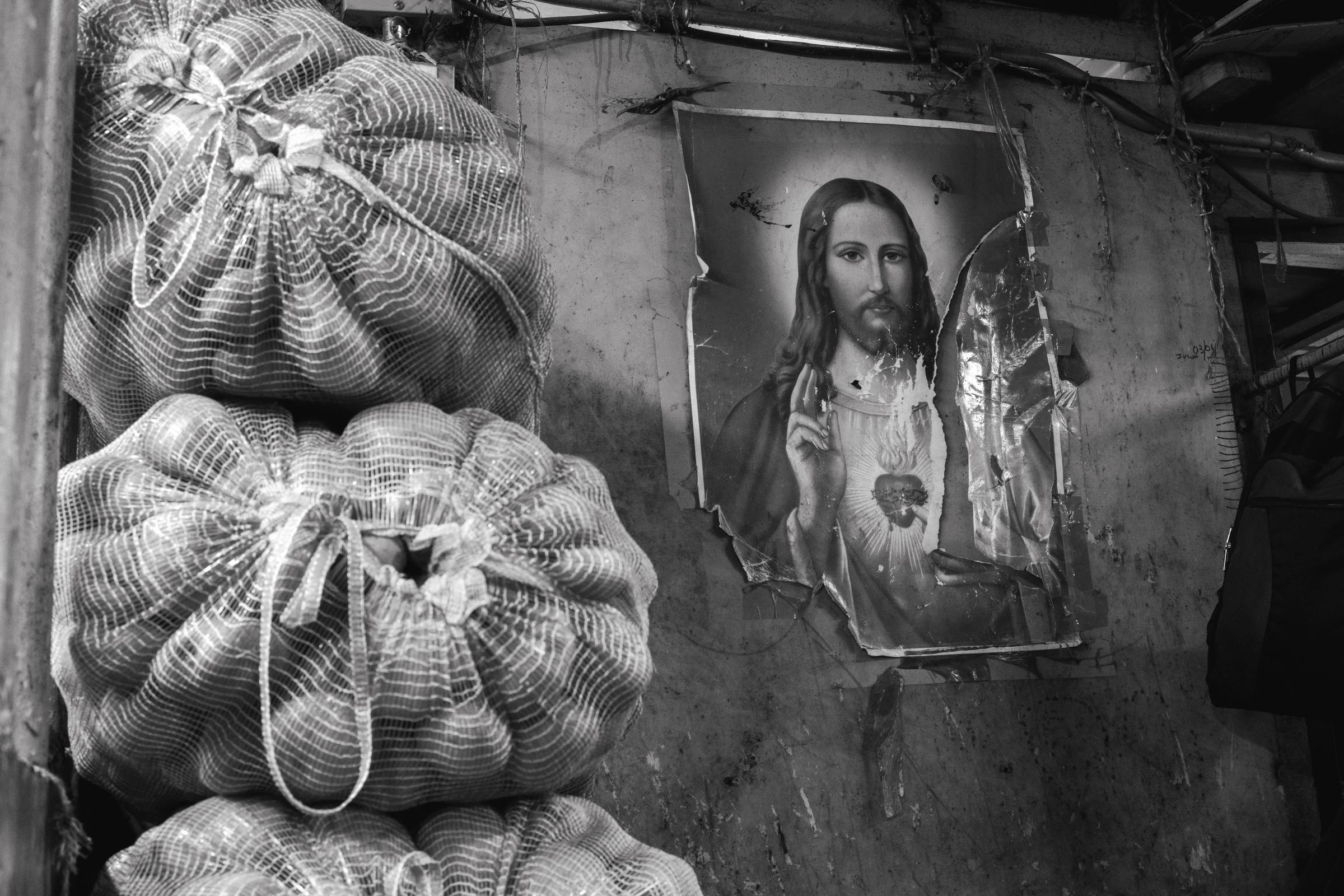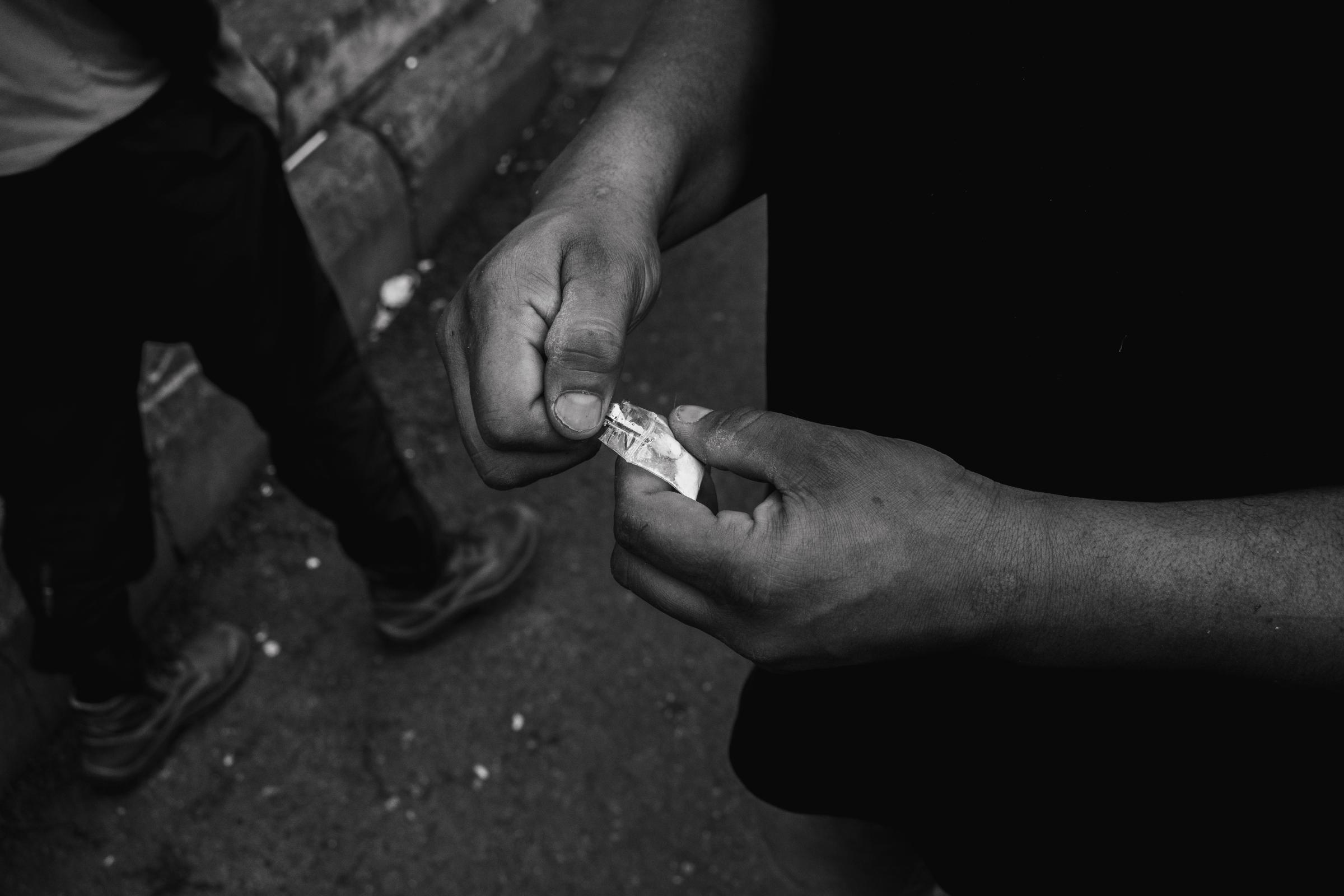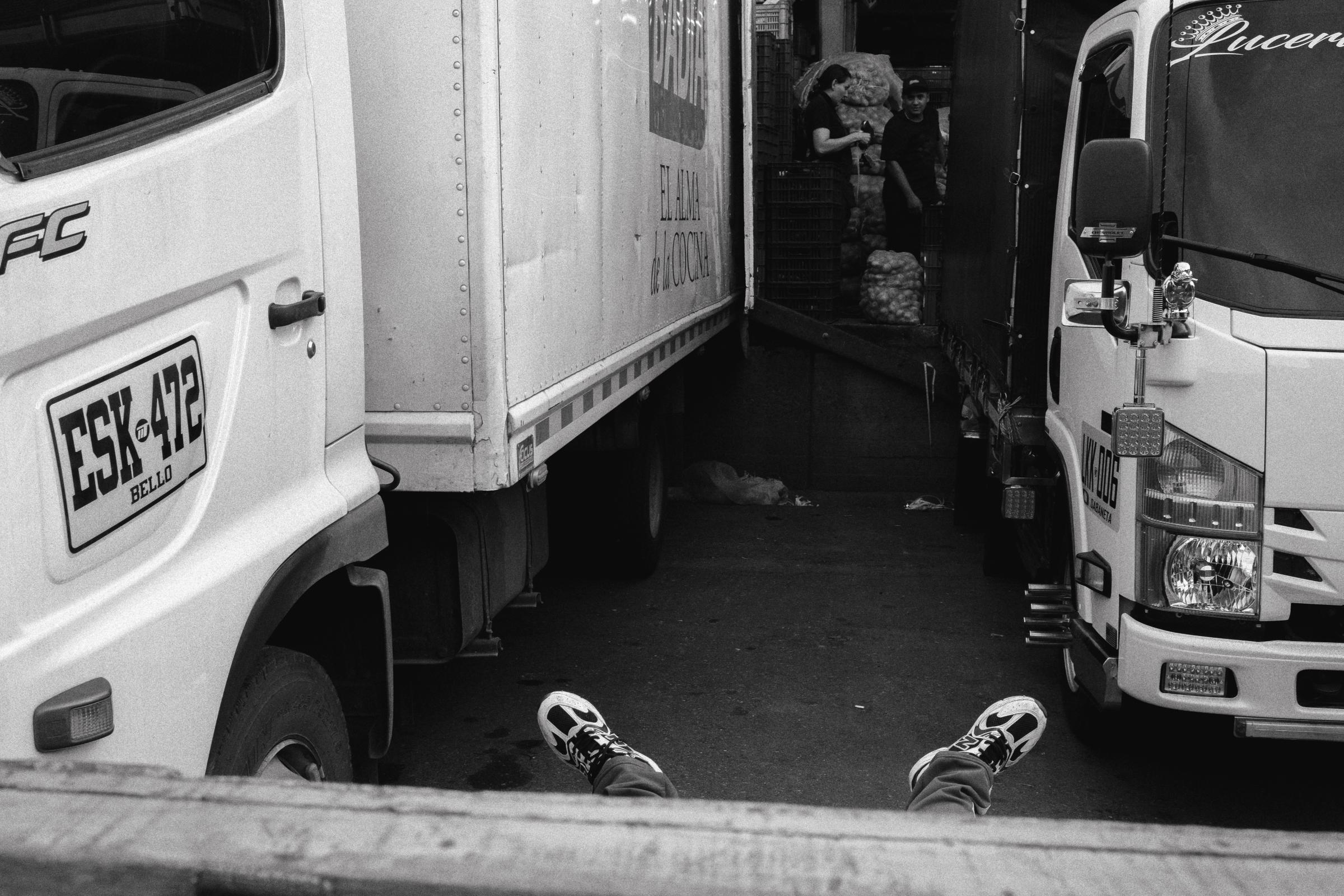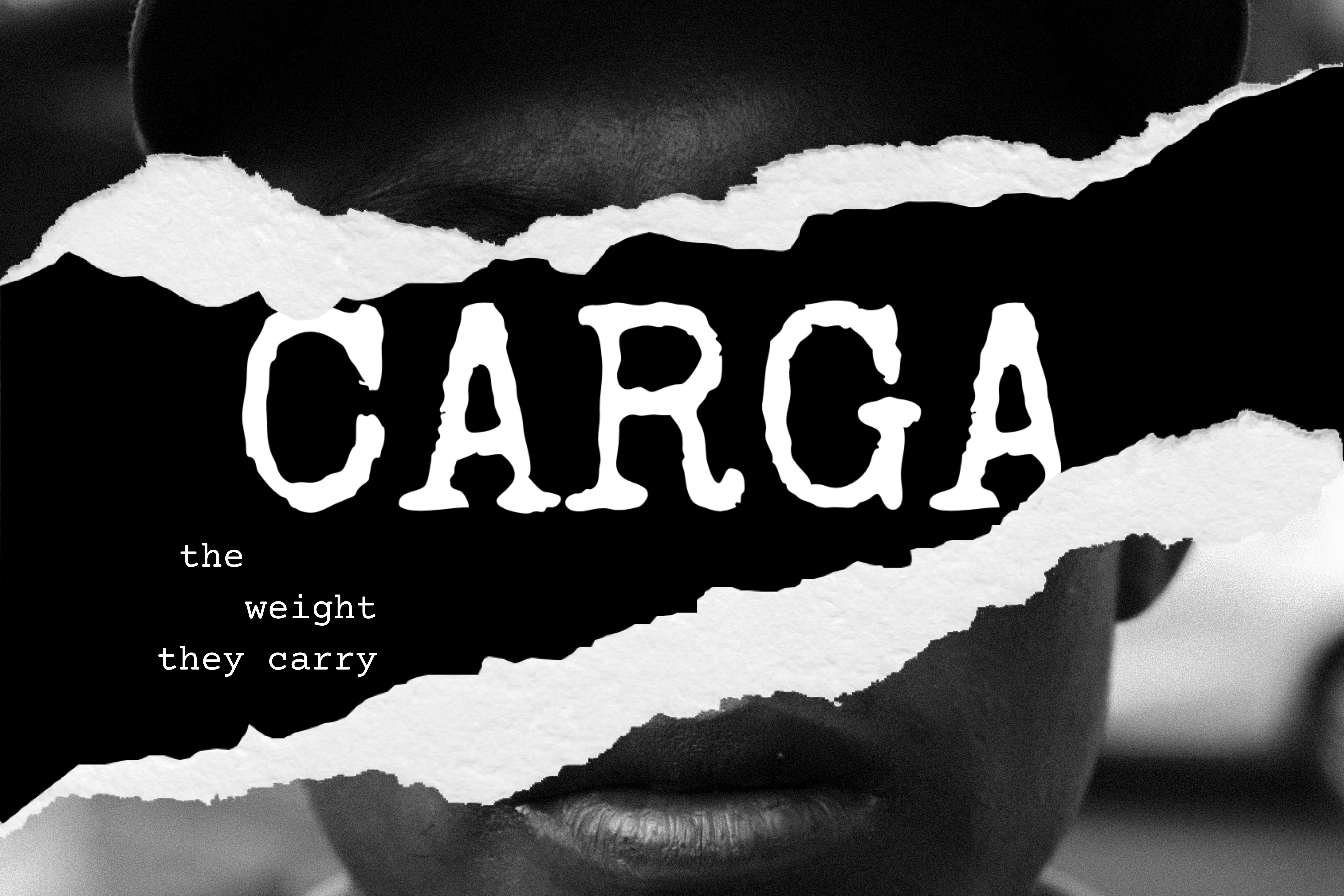Carga: The Weight They Carry
(Scroll right)
The Weight They Carry
In recent years, more than 8 million Venezuelans have fled their country in search of stability - one of the largest migration crises in the world. Colombia has taken in the greatest share, and among the cities that have absorbed this influx, Medellín’s Plaza Mayorista stands as a hub of both opportunity and hardship.
Here, weight defines everything.
The physical weight of sacks filled with potatoes, onions, and plantains - often exceeding 60 kilograms - hauled on the backs of young men through narrow alleys between stalls. The emotional weight of distance from home. The psychological weight of uncertainty, of living day to day, job to job, with no safety net. These burdens, invisible to most who pass through the market, press constantly on the migrants who work within it.
The cargadores, or carriers, are mostly Venezuelan men in their early twenties. Hundreds pass through Plaza Mayorista, some staying for months, others only a few days, depending on whether they find work. Aldair, just 20 years old, left behind a wife, Angela, and two children in Caracas. He arrived in Medellín two weeks ago and is still adjusting. Like many others, he came with little more than the clothes on his back - no savings, no guarantees, only the hope of finding work. Finding work in Mayorista has been difficult, but his voice carries a quiet optimism: his dream is to return to Venezuela and be reunited with his family. Angel, 21, also has a newborn back in Venezuela. He talks about Real Madrid and watches games when he can. For him, Medellín is just a stop on the way - a means to earn, to send money home, and to hope things eventually improve.
Their days begin before sunrise, and often end well into the afternoon. There are no contracts, no guarantees, no fixed pay. Work comes in waves. On a good day, they might earn 50,000 pesos (12USD) - but most days fall short. With rent to split and families to support, there’s little left over. Even securing the day’s work can be uncertain: new faces arrive each week, old ones vanish. The labour pool shifts constantly. It's a grind that rewards strength, stamina, and luck.
But the heaviest loads aren’t the ones on their backs. Many battle loneliness, stigma, and a deep unease about the future. Their presence is tolerated but rarely welcomed. They are seen as transient, disposable. And yet, they show up. Not necessarily because they believe life will get better, but because stopping simply isn’t an option.
The market hums with tension and tempo. The sharp tang of overripe fruit mingles with the acrid sting of diesel. Trucks beep as they reverse into tight corners. Whistles and shouts slice through the air, vying for attention. Deals are made in quick, rhythmic bursts. The place doesn’t rest, nor do those who keep it running.
Many of the young men are hesitant to open up. Bonds form slowly, forged more through shared silence and routine than conversation. Still, moments of levity break through - a joke passed between loads, a pause to rest in the shade, a smile that says: we’re still here. These small gestures speak to a quiet endurance, a way of holding on to something human in the midst of all the weight they carry.
And for some, the pressure becomes too much. With no support systems and few paths forward, some turn to substances - a brief escape from the weight they carry. These are not moral failings, but reflections of what happens when people are forced to rebuild their lives under immense strain and with little help.
One cannot help but notice how young many of them are. Many are barely adults, yet the choices before them demand more than most are ready for. They grow up fast. Not all make the right decisions. But each one navigates an adult world shaped by forces far beyond their control.
Most hope to return home one day, especially those with children. Some consider staying, daring to imagine a new life in Medellín. For now, though, survival is the only certainty. And Plaza Mayorista, with all its chaos and movement, remains both a lifeline and a crucible.
This series is about that weight: visible and invisible. Through these portraits and moments, we glimpse lives shaped by migration, labour, and sacrifice. We see how young men shoulder far more than they should ever have to. And in carrying that burden, their humanity persists: complex, quiet, and unyielding.
Medellín, August 2024 - January 2025
(Desplazarse hacia la derecha)
Carga
En los últimos años, más de 8 millones de venezolanos han huido de su país en busca de estabilidad, una de las mayores crisis migratorias del mundo. Colombia ha sido el país que más venezolanos ha acogido, y entre las ciudades que han absorbido este flujo, la Plaza Mayorista de Medellín se erige como un centro de oportunidades y penurias.
Aquí, la carga lo define todo.
La carga física de los sacos llenos de papas, cebollas y plátanos -que a menudo superan los 60 kilos- cargados a la espalda por hombres jóvenes a través de estrechos callejones. La carga emocional de la distancia del hogar. La carga psicológica de la incertidumbre, de vivir día a día, de trabajo en trabajo, sin red de seguridad. Estas cargas, invisibles para la mayoría de los que pasan por el mercado, presionan constantemente a los emigrantes que trabajan en él.
Los cargadores son en su mayoría hombres venezolanos de poco más de veinte años. Cientos pasan por la Plaza Mayorista, algunos se quedan meses, otros sólo unos días, dependiendo de si encuentran trabajo. Aldair, de apenas 20 años, dejó en Caracas a su esposa, Ángela, y a sus dos hijos. Llegó a Medellín hace dos semanas y aún se está adaptando. Como muchos otros, vino con poco más que lo puesto: sin ahorros, sin garantías, sólo con la esperanza de encontrar trabajo. Encontrar trabajo en Mayorista ha sido difícil, pero su voz transmite un tranquilo optimismo: su sueño es volver a Venezuela y reunirse con su familia. Ángel, de 21 años, también tiene un recién nacido en Venezuela. Habla del Real Madrid y ve los partidos cuando puede. Para él, Medellín es sólo un alto en el camino, un medio para ganar dinero, enviarlo a casa y esperar que las cosas mejoren.
Sus jornadas empiezan antes del amanecer y a menudo terminan bien entrada la tarde. No hay contratos, ni garantías, ni sueldo fijo. El trabajo llega por oleadas. En un buen día, pueden ganar 50.000 pesos (12 USD), pero la mayoría de los días se quedan cortos. Con el alquiler que hay que pagar y las familias que mantener, queda poco. Incluso asegurarse el trabajo diario puede ser incierto: cada semana llegan caras nuevas, las antiguas desaparecen. La mano de obra cambia constantemente. Es un trabajo duro que recompensa la fuerza, la resistencia y la suerte.
Pero las cargas más pesadas no son las que llevan a sus espaldas. Muchos luchan contra la soledad, el estigma y un profundo malestar sobre el futuro. Su presencia se tolera, pero rara vez es bienvenida. Se les considera pasajeros, desechables. Y sin embargo, aparecen. No necesariamente porque crean que la vida mejorará, sino porque dejar de hacerlo no es una opción.
El mercado zumba con tensión y ritmo. El agudo sabor de la fruta demasiado madura se mezcla con el acre picor del gasóleo. Los camiones pitan al entrar marcha atrás en curvas cerradas. Los silbidos y los gritos cortan el aire, compitiendo por la atención. Los tratos se hacen en ráfagas rápidas y rítmicas. El lugar no descansa, ni tampoco quienes lo mantienen en funcionamiento.
Muchos de los jóvenes dudan en abrirse. Los lazos se forman lentamente, forjados más por el silencio y la rutina compartidos que por la conversación. Aun así, surgen momentos de frivolidad: un chiste entre cargas, una pausa para descansar a la sombra, una sonrisa que dice: seguimos aquí. Estos pequeños gestos hablan de una resistencia silenciosa, una forma de aferrarse a algo humano en medio de todo el peso que soportan.
Y para algunos, la presión llega a ser demasiado. Sin sistemas de apoyo y con pocos caminos a seguir, algunos recurren a las sustancias, una breve vía de escape del peso que soportan. No se trata de faltas morales, sino de reflejos de lo que ocurre cuando las personas se ven obligadas a reconstruir sus vidas bajo una inmensa presión y con poca ayuda.
Uno no puede evitar darse cuenta de lo jóvenes que son muchos de ellos. Muchos apenas son adultos y, sin embargo, las opciones que tienen ante sí les exigen más de lo que la mayoría está preparada. Crecen deprisa. No todos toman las decisiones correctas. Pero todos navegan por un mundo de adultos marcado por fuerzas que escapan a su control.
La mayoría espera volver a casa algún día, sobre todo los que tienen hijos. Algunos se plantean quedarse, atreviéndose a imaginar una nueva vida en Medellín. Por ahora, sin embargo, la supervivencia es la única certeza. Y la Plaza Mayorista, con todo su caos y movimiento, sigue siendo a la vez un salvavidas y un crisol.
Esta serie trata de ese peso: visible e invisible. A través de estos retratos y momentos, vislumbramos vidas moldeadas por la migración, el trabajo y el sacrificio. Vemos cómo los jóvenes cargan con mucho más de lo que deberían. Y al llevar esa carga, su humanidad persiste: compleja, silenciosa e inquebrantable.
Medellín, agosto de 2024 - enero de 2025
Con más de 60 kilos de peso, este cargador transporta mercancías entre los puestos. Para muchos emigrantes, este agotador trabajo no es sólo un empleo: es un salvavidas en una ciudad desconocida, donde empezar de nuevo significa soportar inmensas cargas físicas y emocionales. Plaza Mayorista, Medellín. Tomada el 19 de noviembre de 2024.
Aldair, de 20 años, tiene una esposa y dos hijos que le esperan en Caracas. Apenas dos semanas después de empezar a buscar trabajo aquí, se enfrenta a la pesada presión de proveer desde lejos, suspendido entre la responsabilidad y lo desconocido. Medellín, 12 de diciembre de 2024.
Con 288.000 metros cuadrados, la Plaza Mayorista es el mayor mercado mayorista de Medellín, un centro en expansión donde miles de personas dependen de trabajos informales para llegar a fin de mes. Tomada el 28 de agosto de 2024.
Dos cargadores hacen una breve pausa entre carga y carga. Para algunos, el desgaste físico de las largas horas, los pesados sacos y el ritmo interminable resulta abrumador. Sin embargo, el trabajo continúa, impulsado por la necesidad y la esperanza de un mañana mejor. Tomada el 19 de diciembre de 2024.
Plátanos demasiado maduros destinados a la basura se convierten en una comida compartida al final del día, un pequeño momento de alivio para los trabajadores atrapados entre la escasez y la supervivencia. 28 de agosto de 2024.
Cada día pasan por la Plaza Mayorista unas 9.000 toneladas de alimentos, muchos de ellos transportados a mano, saco a saco. La vida del mercado fluye a través de estos trabajadores, aunque sus historias pasen casi desapercibidas. 2 de enero de 2025.
Para muchos de los que huyeron de Venezuela, el dolor de dejar el hogar es un compañero constante. La separación, la incertidumbre y la lenta reconstrucción de la vida lejos: estas cargas se llevan en silencio, todos los días. Medellín, 19 de diciembre de 2024.
Más allá de las cargas físicas, los inmigrantes suelen enfrentarse a retos sociales, como la discriminación. En el bullicioso mercado, transportar mercancías es sólo una parte de la lucha por la aceptación y la dignidad. Medellín, 5 de diciembre de 2024.
El tatuaje de Ángel reza 'Nunca dejes de sonreír'. Sus manos, manchadas por horas de trabajo, llevan las marcas tanto de la dureza como de la tranquila determinación. Medellín, 28 de agosto de 2024.
Para muchos jóvenes inmigrantes, el trabajo estable nunca está garantizado. Cada día es una apuesta, un equilibrio precario entre ganar lo suficiente para sobrevivir y la aplastante espera de una oportunidad. Dos sentados juntos; uno mirando el móvil, otro durmiendo. Tomada el 3 de diciembre de 2024, Medellín.
Estos jóvenes apuestan su salario ganado con sudor y esfuerzo a los dados y se aferran a fugaces momentos de evasión de sus inciertas vidas, momentos que les proporcionan distracción pero poca certidumbre. Plaza Mayorista, Medellín. Tomada el 19 de noviembre de 2024.
Sentados y agotados, estos trabajadores se toman su primer descanso desde la 1 a.m. Sus turnos de 12 horas exigen un esfuerzo incesante con escaso respiro - el descanso es un regalo raro y precioso. Plaza Mayorista, Medellín. Tomada el 15 de noviembre de 2024.
Aquí la fuerza es supervivencia. Un cargador flexiona su bíceps con orgullo: el músculo y las agallas a menudo marcan la diferencia entre un trabajo estable y ninguno. 19 de noviembre de 2024, Medellín.
Rasgada, pegada y desgastada, esta imagen perdura. Lleva en silencio la esperanza y la fe a las que se aferran los inmigrantes cuando reconstruyen sus vidas, lejos de todo lo que conocen. Plaza Mayorista, Medellín. Tomada el 26 de noviembre de 2024.
Las noches en vela y el trabajo agotador llevan a algunos trabajadores a recurrir a duros mecanismos de supervivencia. El consumo de sustancias -una sombría realidad oculta tras el caos del mercado- refleja las inmensas presiones a las que estos hombres se enfrentan a diario. Plaza Mayorista, Medellín. Tomada el 15 de noviembre de 2024.
En las sombras del mercado, innumerables vidas pasan desapercibidas. No están marcadas por grandes momentos, sino por una resistencia silenciosa, por sueños reformados y vidas rehechas bajo el peso de la realidad. Plaza Mayorista, 28 de noviembre de 2024.
A Visual Story by Jeremy Skirrow

